Spring stalled mid-melt, dithering in delay, making us regular-walkers strap crampons to our boots. These pictures are of the path I take, one March 13th, the other just yesterday.
And here’s the dog wishing he could get at the geese.
Your Custom Text Here
Spring stalled mid-melt, dithering in delay, making us regular-walkers strap crampons to our boots. These pictures are of the path I take, one March 13th, the other just yesterday.
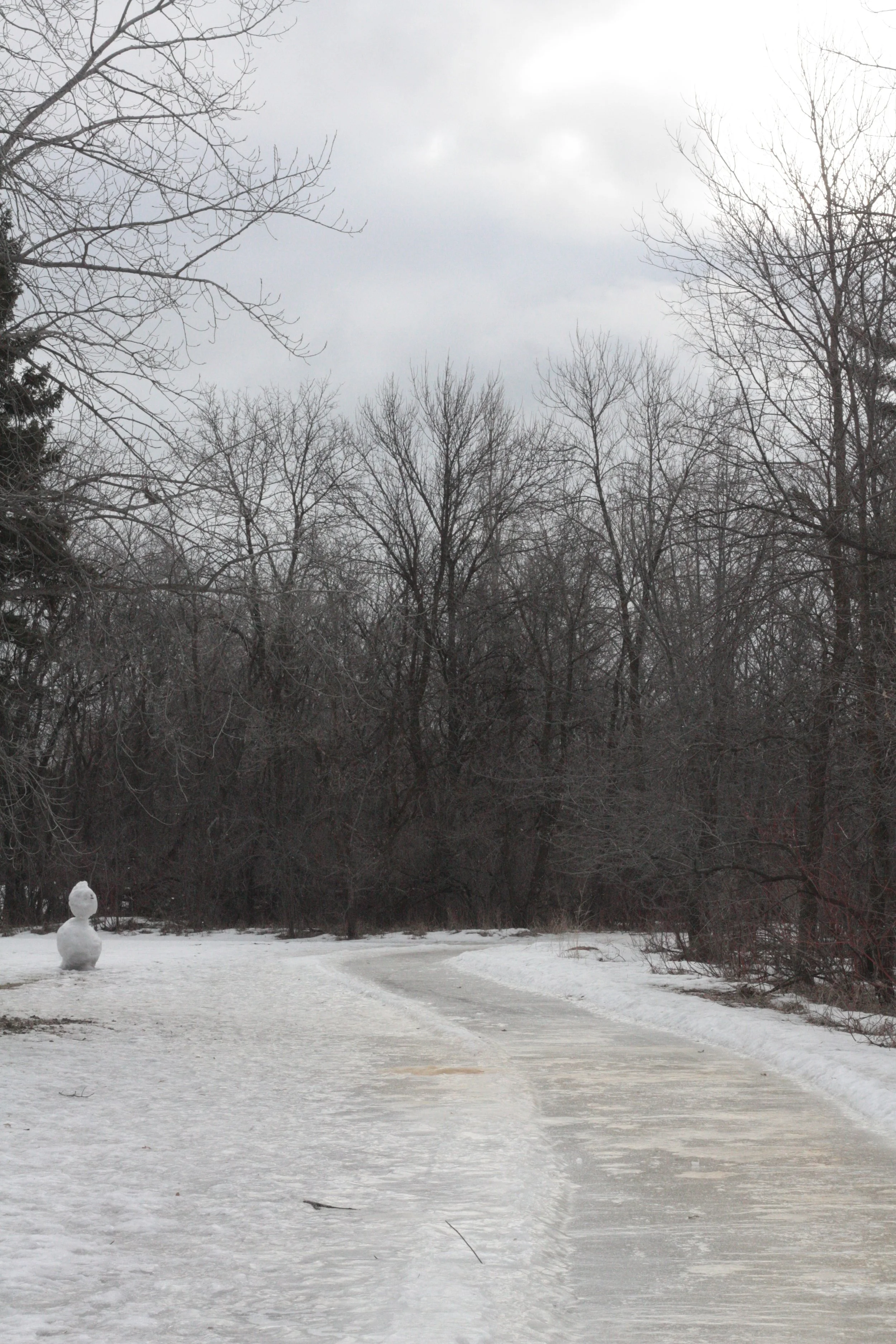
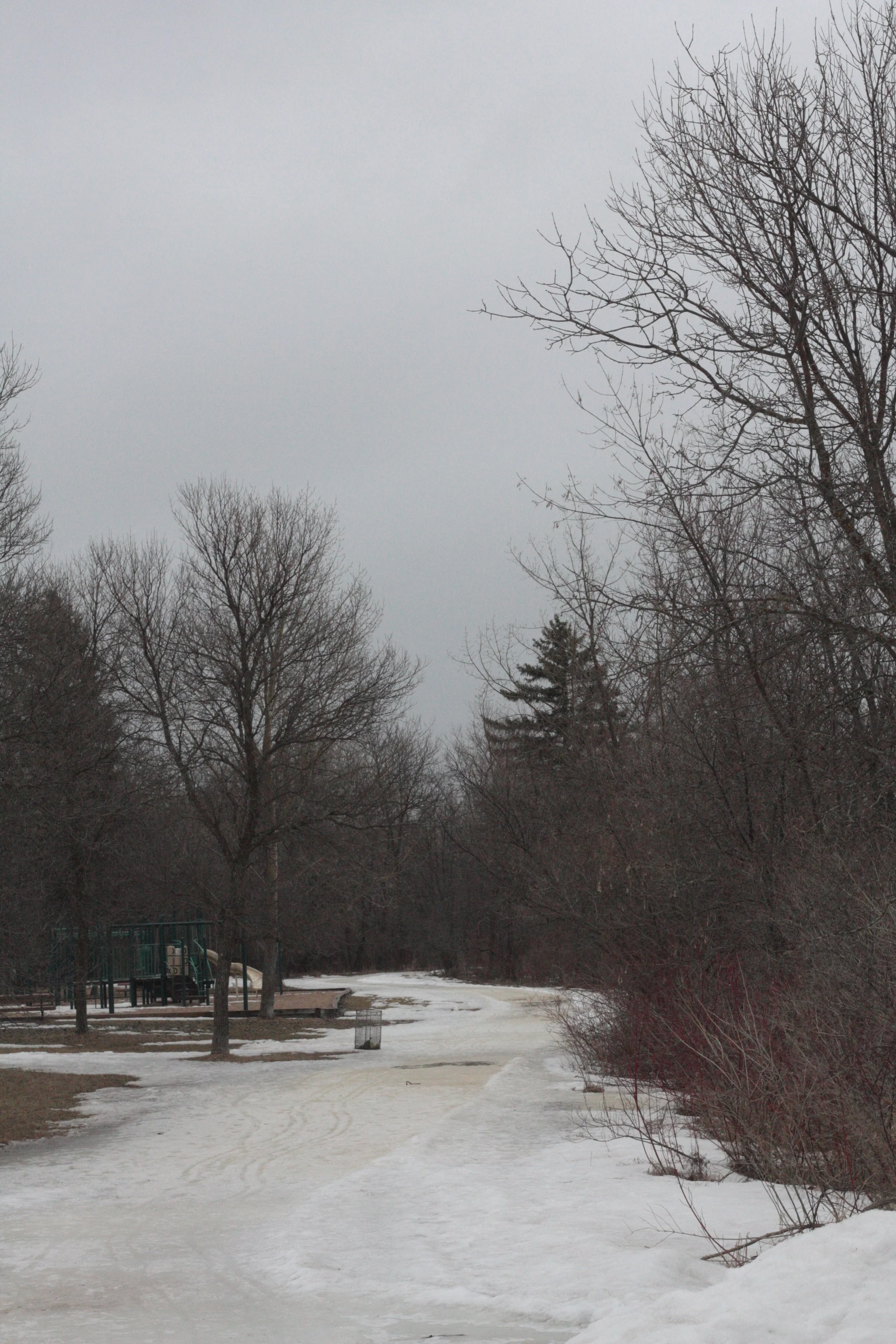
And here’s the dog wishing he could get at the geese.
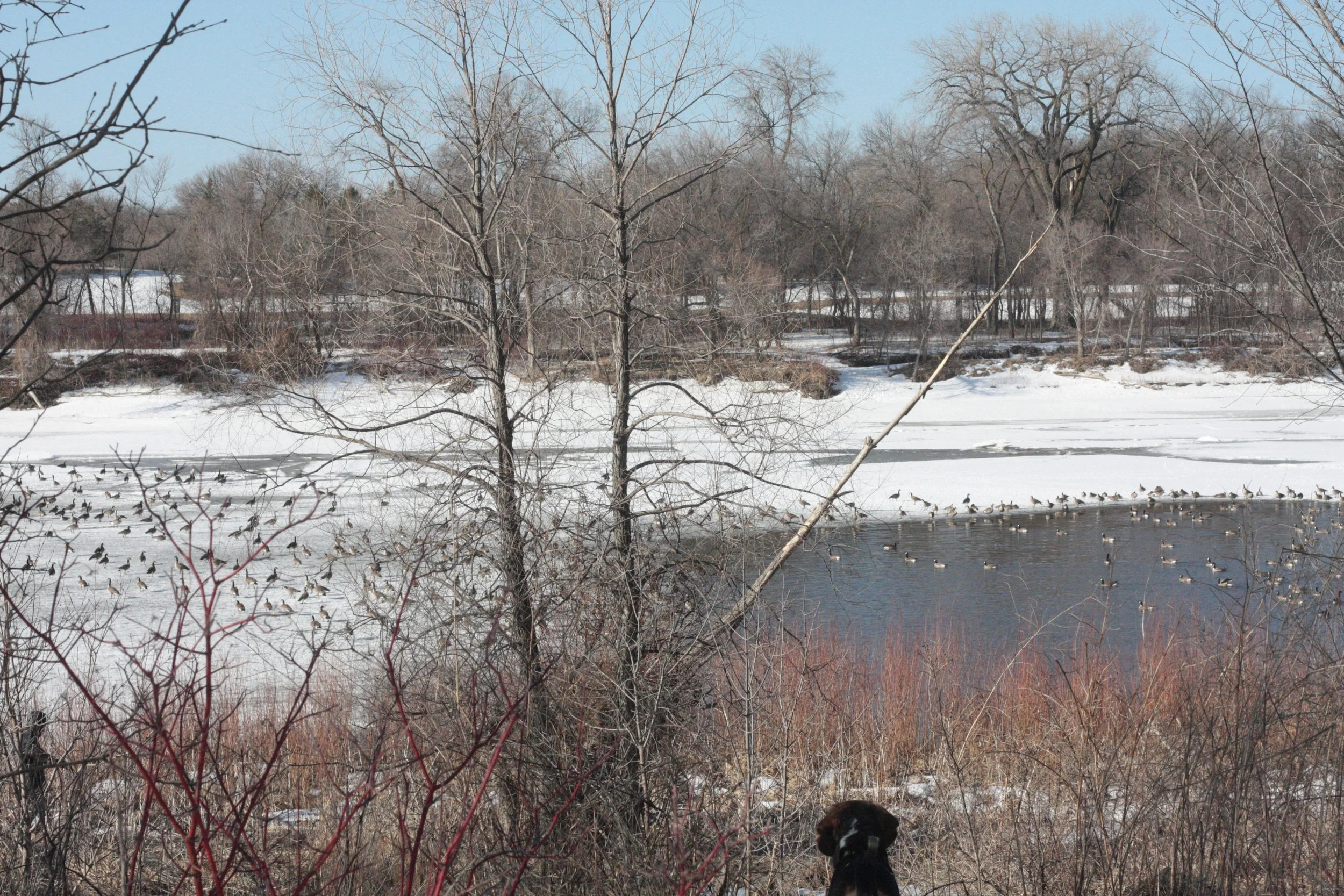
Since hearing this podcast episode several weeks ago, Derek Thompson’s comparison has stuck in my mind as an encapsulation of how I feel writing this thesis. Here’s the quote, lightly edited:
One thing I learned writing my first book [...] is that writing changes so much as the length of the work changes; that in a way, blogging is pure writing and by the time you get to a book, writing a book is actually not entirely writing, it's almost more organizing, than it is writing. One way that I thought of it is like if you're writing an article, it's almost like shopping for one shirt. I'm just looking for one data set about Americans hanging out less. And once I find that data set, I've found my shirt, I can write the article. Writing a column sometimes, like a 3000 word column, is more like buying furniture for a room. It's a lot of buying stuff and when you buy it, you have to lay it out and once you've laid it out, you're like ok, now the room is together. Writing a book is like buying a new house and outfitting it with furniture. I mean, yes, it is about buying stuff, but the biggest job for a new house is figuring out where all the damn stuff goes. And that's the major challenge with a book, so that's how I think about it at a conceptual level.
April Fool’s in French is Poisson d’avril, and poisson means fish, and so, my pranks have been food-themed. In the past there has been miracle berry experiments, liquid-turned-to-gel, and squid-ink pasta. This year was bug themed:

I put them in their lunches, as snacks. “There’s no way I’m eating ants!” said one, who gave it to her friends. The other thought the packaging was a spoof, did not read the ingredient list and had a friend, anyway, who’d eaten fried earthworms. He said they were good. And the third put it back in his lunch box and ignored it.
In January I liked:
Keeping a bullet journal anew
Tracking our family meals
Buying two cookbooks at a local bookstore (Start Here, Company; at McNally)
Trying their recipes
Watching a tidy thriller (The K_.ller)
Being disabused of the tidiness of violence (Miles Johnson on Longform)
Walt Hickey’s enjoyment of having a variety of writing avenues (PIMA)
Sandi Hester’s encouragement for creativity (Youtube)
The research and story-making itch of a podcast like The Big Dig
Skating on a pond in the moonlight.
What is reading if one doesn’t keep an account of it? Ah, yes, the wonderful New Year’s resolution to grab those titles, to pin them down with a scribble of writing, to squeeze out some quotes and drop them here, to say, look! I’m reading!
First, well, I haven’t been reading, I've been listening… Audiobooks is all I have time for when writing an academic chef-d’oeuvre, so, I present to you, the things listened to…
Most recently: The Heaven and Earth Grocery Store by James McBride. (Here I imagine a spray of confetti. I don’t know why.) Lovely book, lots of characters, tidy end, and this one quote in which, I feel, McBride might be saying “this is the moral of my story”, but who knows. I like it because it gestures toward History.
(From Chapter 18) The odd group of well-wishers slowly moved down the hallway [...] as the group trumped forward, a rag-tag assortment of travellers moving 15 feet as if it were 15 thousand miles, slow travellers all, arrivals from different lands making the low trek through a country that claimed to be so high, a country that gave them so much yet demanded so much more. They moved slowly like fusgeyers, wanderers seeking a home in Europe, or Aroo [sp?], West-African tribesmen, herded off a ship on a Virginia shore to peer back across the Atlantic in the direction of their homeland one last time, moving toward a common destiny, all of them, Isaac, Nate and the rest, into a future of American nothing. It was a future they couldn't quite see, where the richness of all they had brought to the great land of promise would one day be zapped into nothing, the glorious tapestry of their history, boiled down to a series of ten-second tv commercials, empty holidays, and sports games filled with the patriotic fluff of Red, White and Blue, the celebrants cheering the accompanying dazzle without any idea of the horrible struggles and proud pasts of their forebears who had made their lives so easy. The collective history of this sad troop, moving down the hospital corridor would become tiny blots in an American future that would one days scramble their proud histories like eggs, scattering them among the population while feeding mental junk to the populace on devices that would become as common and small as the hot dog that the dying woman thought she smelled.
I also like hot dogs.
Next, finished just last year, Transcendant Kingdom by Yaa Gyasi. I wanted to pause here to praise the narrator, Bahni Turpin, and thank goodness for a quick Google search… I see she’s been praised a bunch, so we’re going to move on. Still, uh, I’m tempted to add that the narration here might have made this book more fun to listen to than to read… On with the quotes.
This, from Chapter 8, is a cool analogy of what research feels like.
Mrs Pasternak said something else that year that I never forgot. She said, "The truth is, we don't know what we don't know. We don't even know the questions we need to ask in order to find out, but when we learn one tiny little thing, a dim light comes on in a dark hallway and suddenly a new question appears. We spend decades, centuries, millenia, trying to answer that one question so that another dim light will come on. That's science. But that's also everything else, isn't it? Try. Experiment. Ask a ton of questions."
Asking a ton of questions has never been a problem for me. I should be an interviewer. Actually, I think that conversation is different though… it’s not about asking a ton of questions, it’s more about what questions are asked. It can make a conversation boring or interesting, and maybe that’s the fun of it.
Onward!
This quote, from Chapter 40 makes me think of Brad S. Gregory’s book, The Unintended Reformation (I read it a year ago now, and made a summary here).
This is something I would never say in a lecture, or a presentation, or, God forbid, a paper, but at a certain point, science fails. Questions become guesses, become philosophical ideas about how something should probably, maybe, be. I grew up around people who were distrustful of science, who thought of it as a cunning trick to rob them of their faith. And I have been educated around scientists and lay people alike who talk about religion as though it were a comfort blanket for the dumb and the weak, a way to extol the virtues of a God more improbable than our own human existence. But this tension, this idea that one must necessarily choose between science and religion, is false. I used to see the world through a God lens and when that lens clouded, I turned to science. Both became for me, valuable ways of seeing, but ultimately both have failed to fully satisfy in their aim: to make clear, to make meaning.
But, back to non-controversial topics, the following quote is a touching reflection on the problem of drug-addiction and the people affected by it. It’s from Chapter 42.
And that's what so many people want to get at: the cause of the drug use, the reason people pick up substances in the first place. Anytime I talk about my work informally, I inevitably encounter someone who wants to know why addicts become addicts. They use words like "will" and "choice" and they end by saying, "don't you think there's more to it than the brain?" They're skeptical of the rhetoric of addiction as disease, something akin to high blood pressure or diabetes, and I get that. What they're really saying is that they may have partied in highschool and college but look at them now, look how strong-willed they are, how many good choices they've made. They want reassurances, they want to believe that they have been loved enough and have raised their children well enough, that the things that I research will never, ever touch their own lives. I understand this impulse. I too have spent years creating my little moat of good deeds in an attempt to protect the castle of my self. I don't want to be dismissed the way Nana was once dismissed. I know that it's easier to say "their kind does seem to have a taste for drugs," easier to write all addicts off as bad and weak-willed people, than it is to look closely at the nature of their suffering. I do it too, sometimes. I judge. I walk around with my chest puffed out, making sure that everyone knows about my Harvard and Stanford degrees, as if those things encapsulate me. And when I do so, I give in to the same facile, lazy thinking that characterizes those who think of addicts as horrible people. It's just that I'm standing on the other side of the moat. What I can say for certain, is that there is no case study in the world that could capture the whole animal of my brother, that could show how smart and kind and generous he was, how much he wanted to get better, how much he wanted to live. Forget for a moment what he looked like on paper, and instead, see him as he was, in all of his glory, in all of his beauty. It's true that for years before he died, I would look at his face and think; "what a pity, what a waste." But the waste was my own. The waste was what I missed out on, whenever I looked at him and saw just his addiction.
Recently, on our Jamaica trip, my mother-in-law looked over at me and asked what kind of book I was reading. (It was a holiday, and so contrary to the whole “I’m only listening to audiobooks” spiel above, I had a physical book in my hands.) When I told her it was fiction, she smiled and said she preferred non-fiction.
I do too!
Most of the time!
But the above quote? That’s why there’s fiction!
Do you know why else there’s fiction? For long heartbreaking passages, like the following one, from Small Island by Andrea Levy. I wanted something to read carelessly, at the beach or sheltering from the rain, or bored-to-smiles in an airplane, but mostly, I wanted something about Jamaica. Small Island is full of snappy sentences, funny and bright with imagery. Set in 1948, it describes character’s stories as they live through the war. The long passage is the following:
See me now - a small boy, dressed in a uniform of navy blue, a white shirt, a tie, short trousers and long white socks. I am standing up in my classroom; the bright sunlight through the shutters draws lines across the room. My classmates, my teacher all look to me, waiting. My chest is puffed like a major on parade, chin high, arms low. Hear me now - a loud clear voice that pronounces every p and q and all the letters in between. I begin to recite the canals of England: the Bridgewater canal, the Manchester-to-Liverpool canal, the Grand Trunk canal used by the china firms of Stoke-on-Trent. I could have been telling you of the railways, the roadways, the ports or the docks. I might have been exclaiming on the Mother of Parliaments at Westminster - her two chambers, the Commons and the Lords. If I was given a date I could stand even taller to tell you some of the greatest laws that were debated and passed there. And not just me. Ask any of us West Indian RAF volunteers - ask any of us colony troops where in Britain are ships built, where is cotton woven, steel forged, cars made, jam boiled, cups shaped, lace knotted, glass blown, tin mined, whisky distilled? Ask. Then sit back and learn your lesson.
Now see this. An English soldier, a Tommy called Tommy Atkins. Skin as pale as soap, hair slicked with oil and shinier than his books. See him sitting in a pub sipping a glass of warming rum and rolling a cigarette from a tin. Ask him, "Tommy, tell me nah, where is Jamaica?"
And hear him reply, "Well, dunno. Africa, ain't it?"
See that woman in a green cotton frock standing by her kitchen table with two children looking up at her with lip-licking anticipation. Look how carefully she spoons the rationed sugar into the cups of chocolate drink. Ask her what she knows of Jamaica. "Jam- where? What did you say it was called again. Jam- what?"
And here is Lady Havealot, living in her big house with her ancestors' pictures crowding the walls. See her having a coffee morning with her friends. Ask her to tell you about the people of Jamaica. Does she see that small boy standing tall in a classroom where sunlight draws lines across the room, speaking of England - of canals, of Parliament and the greatest laws ever passed? Or might she, with some authority, from a friend she knew or a book she'd read, tell you of savages, jungles and swinging through trees?
It was inconceivable that we Jamaicans, we West Indians, we members of the British Empire would not fly to the Mother Country's defence when there was a threat. But, tell me, if Jamaica was in trouble, is there any major, any general, any sergeant who would have been able to find that dear island? Give me a map, let me see if Tommy Atkins or Lady Havealot can point to Jamaica. Let us watch them turning the page round, screwing up their eyes to look, turning it over to see if perhaps the region was lost on the back, before shrugging defeat. But give me that map, blindfold me, spin me round three times and I, dizzy and dazed, would still place my finger squarely on the Mother Country. (p 117-9)
Blindfold me, spin me round and my hands will find a book. Hooray for books! Listening to this “Writers and Company” episode, you can hear in the first half the absence of books growing up for one writer, the disdain for the plentiful-ness of books everywhere for another…
But this is long enough and the subject of books is inexhaustible. So here, I’ll take a bow, gather my bookmarks and be off. May you enjoy your reading wherever you are.
We are home now, having arrived as snow was falling Friday night into Saturday and, after ten days of sleeping under a single sheet as fans chased air around our 26-degree room, we embraced our beds, heavy with covers, in our night-chilled rooms. Here is a little summary of our 10 day stay in Port Antonio, with Christian’s brother Michel at the Oratorians.
First, this is a view of the house on a peninsula that welcomed us:

This is the view from the kitchen, into the backyard and beyond that, onto Port Antonio’s harbour.

And this was our room:

The boys were quickly used to jumping into the pool after breakfast.
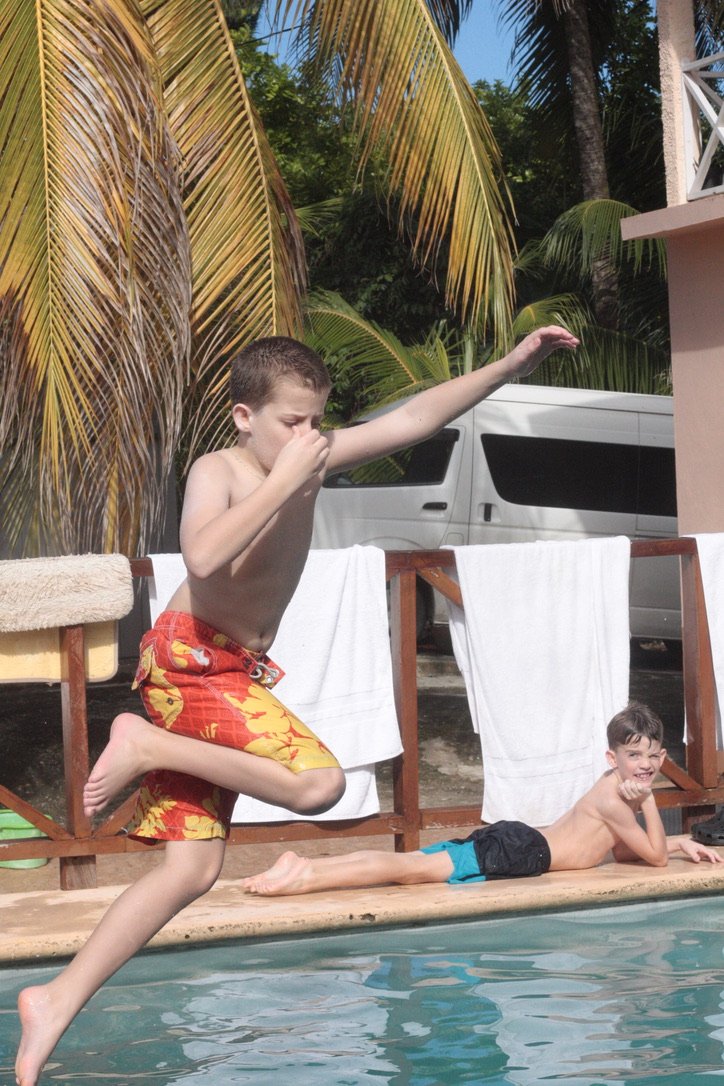
Separating the backyard from the port is the Errol Flynn Marina.
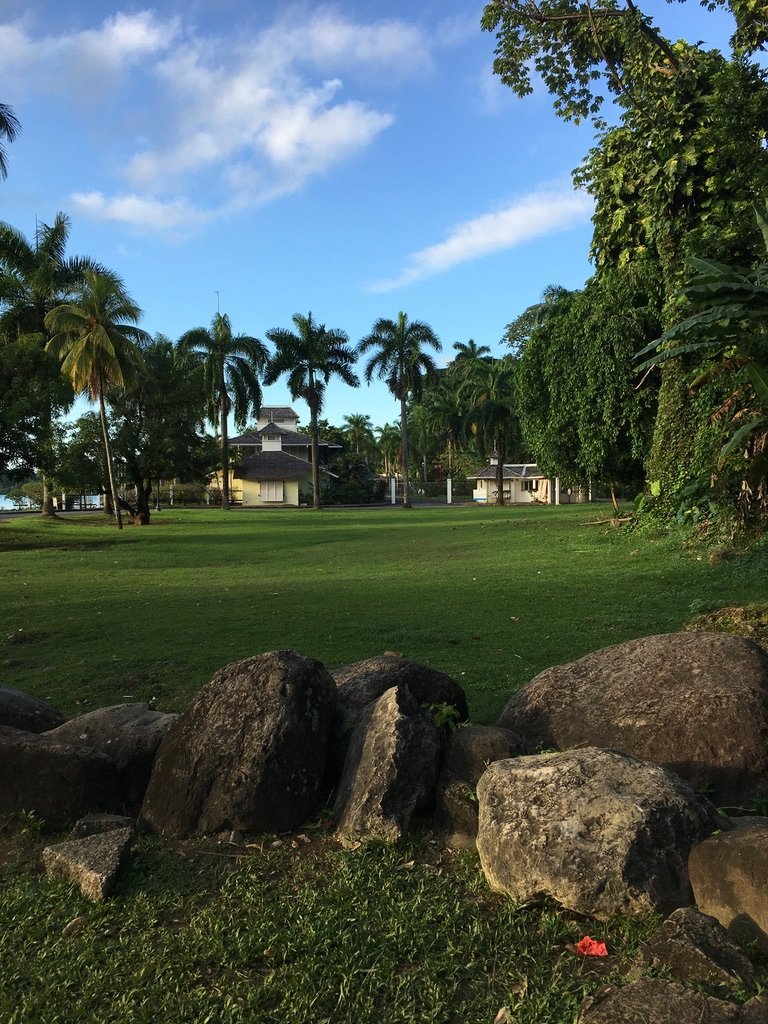

Cruises dock here,

…as one did on a rainy day at the end of December:
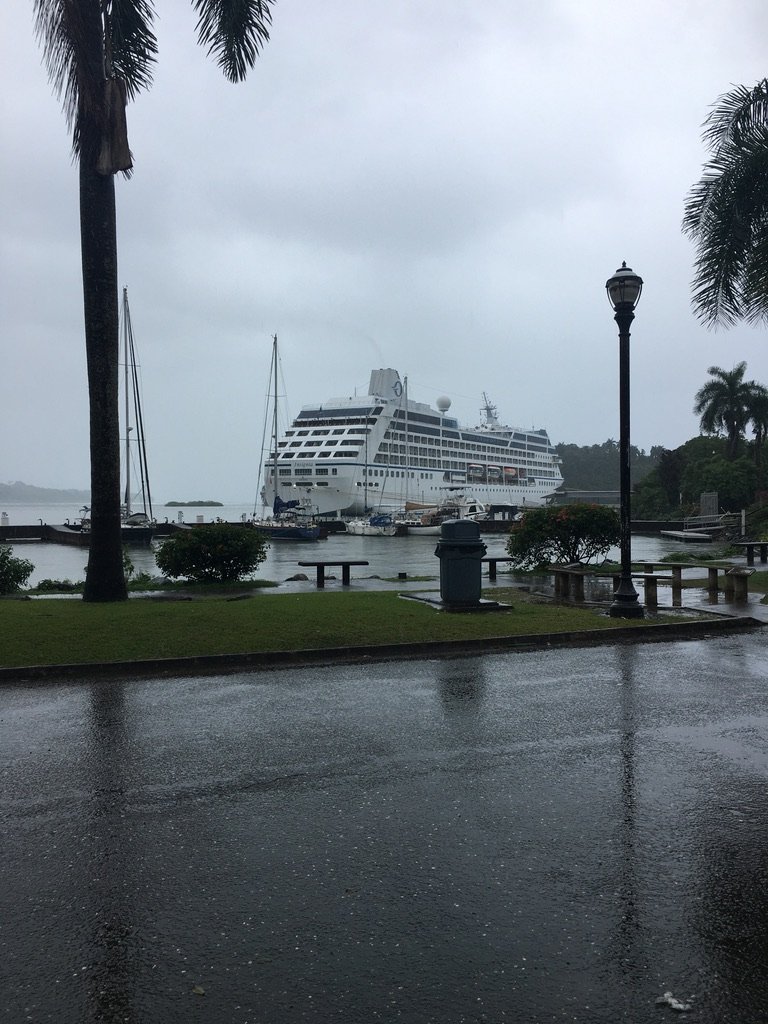
Which, seen from the upstairs of the house, still looked imposing.

The Marina has a small beach, which we happily took advantage of, often feeling like it was a private one.


A little past the beach, the view rounded a bend and you could see the lighthouse in the distance.
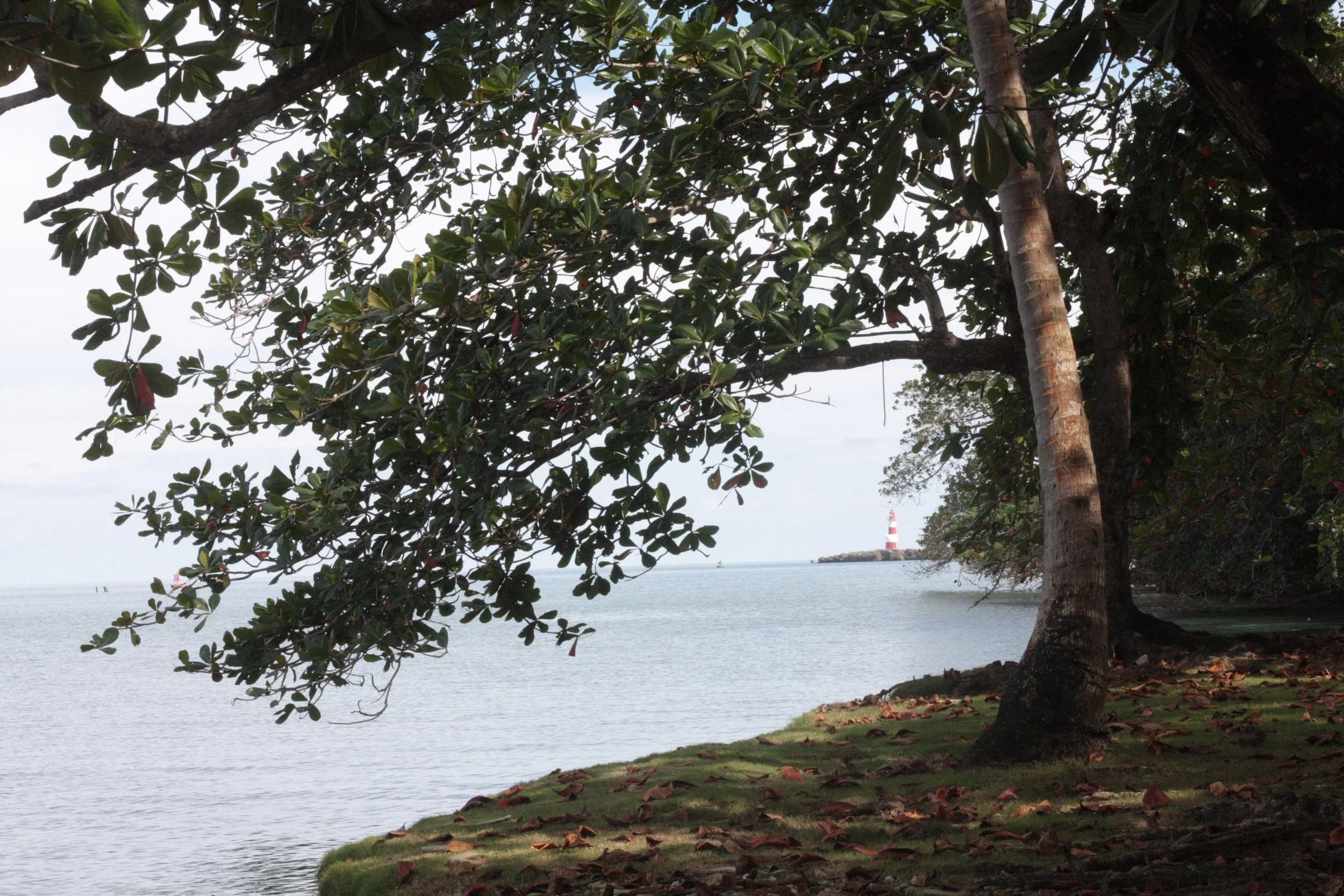
On one of our sight-seeing expeditions, we visited the lighthouse:

Marie-Helene took this picture of it:
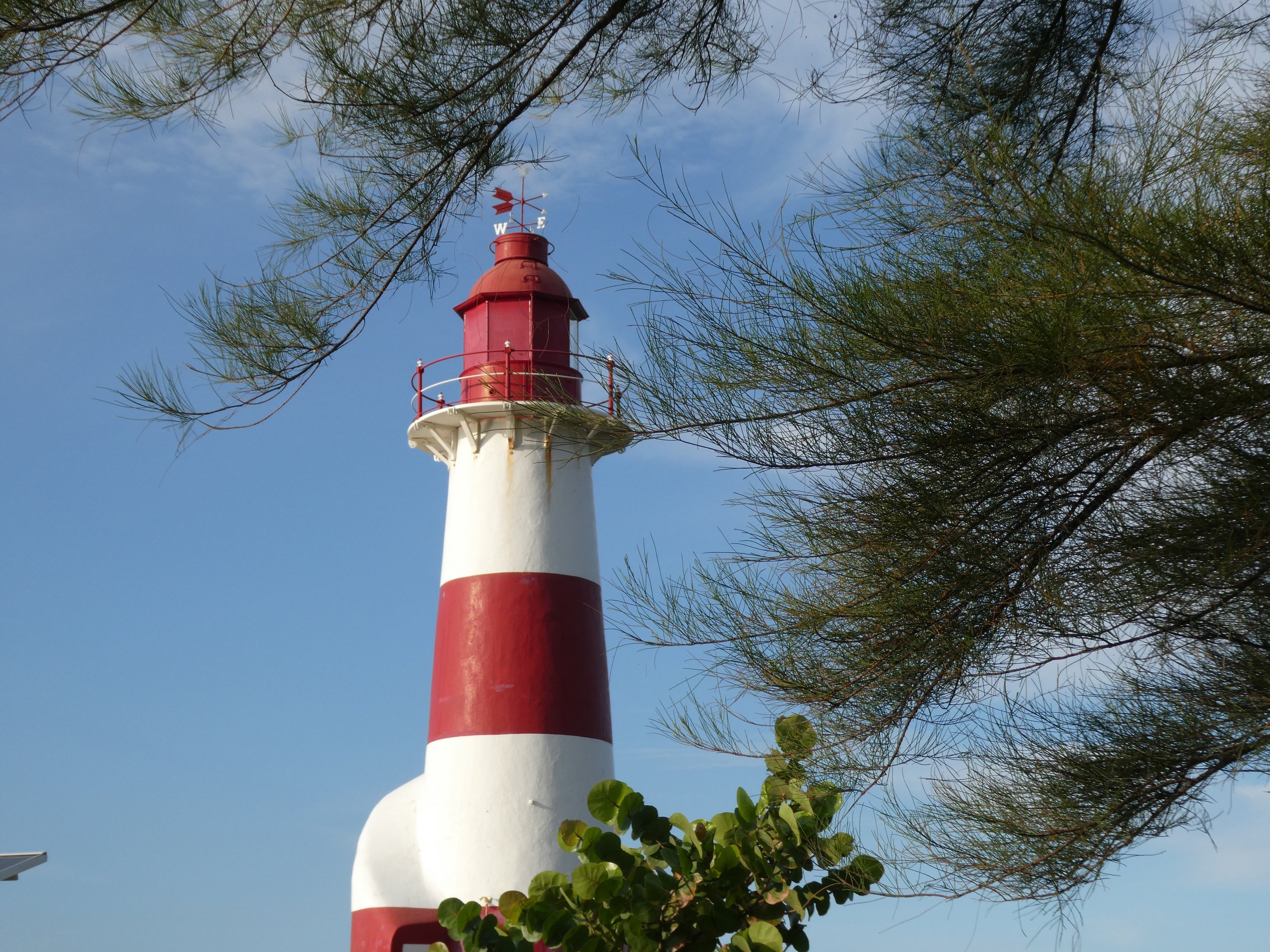
And she took a picture of us taking a selfie:
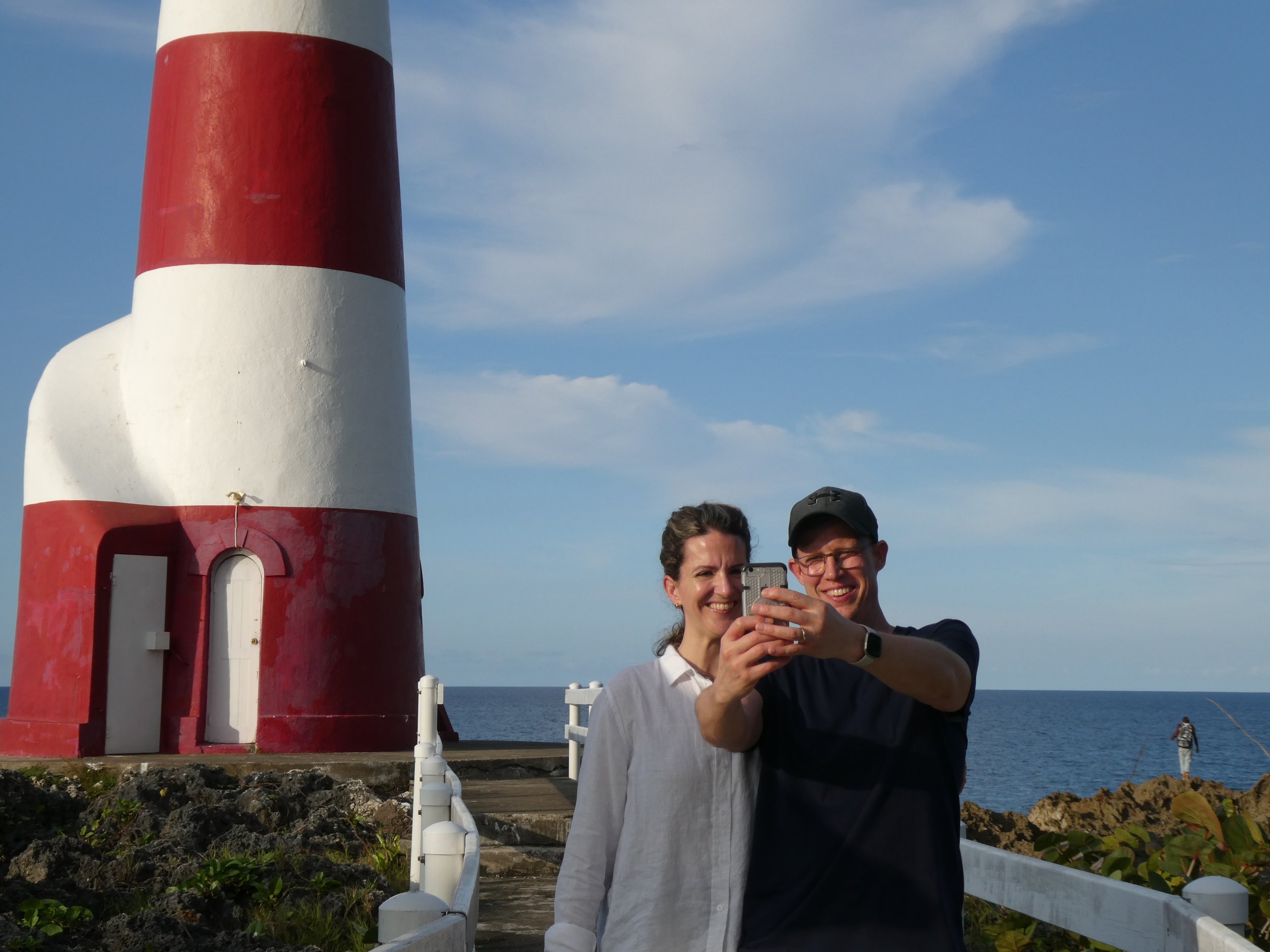
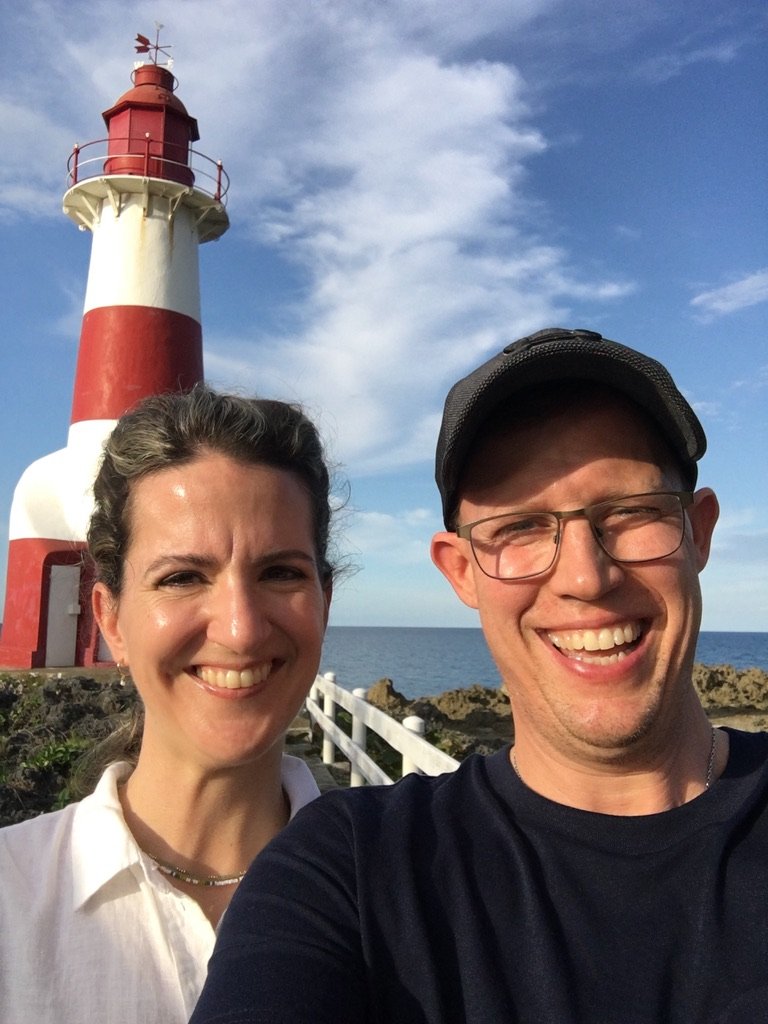
Nearby was Folly Ruins.
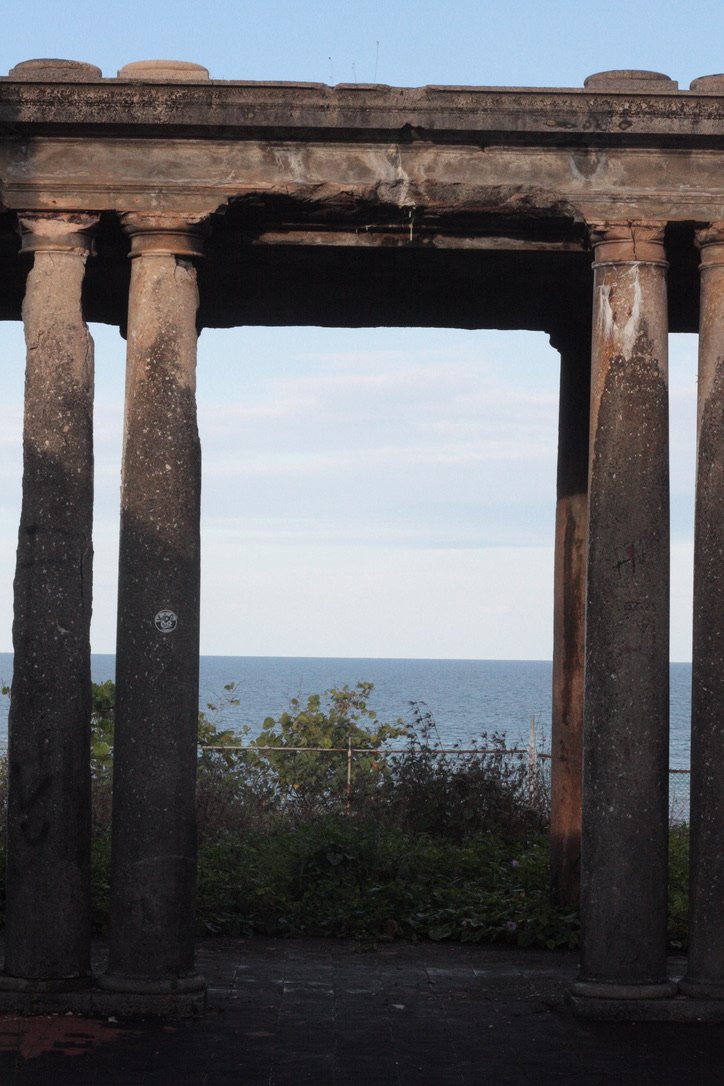
We climbed them and took more pictures…

Admired the view…

And climbed down again…
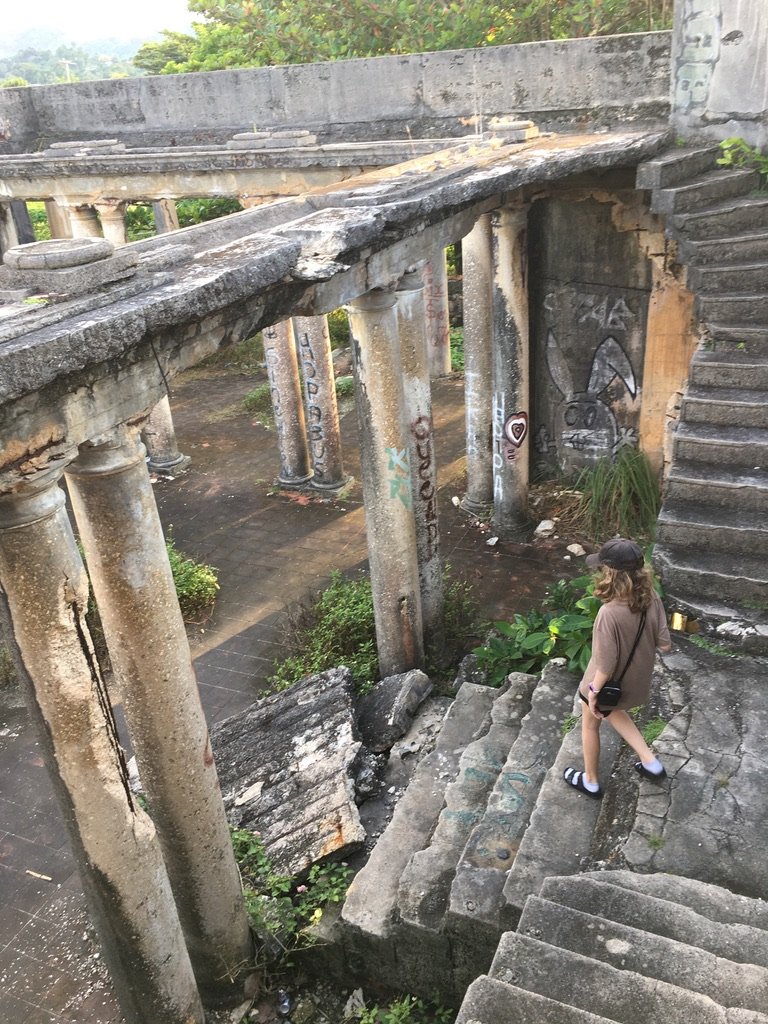


Sightseeing lead to more views…

And spotting the parish’s church from a distance:

The house had four guard dogs who lounged around the yard between their guard-dog duties to which they readily rallied at the least sound with a salvo of barking for anyone walking past in the street.

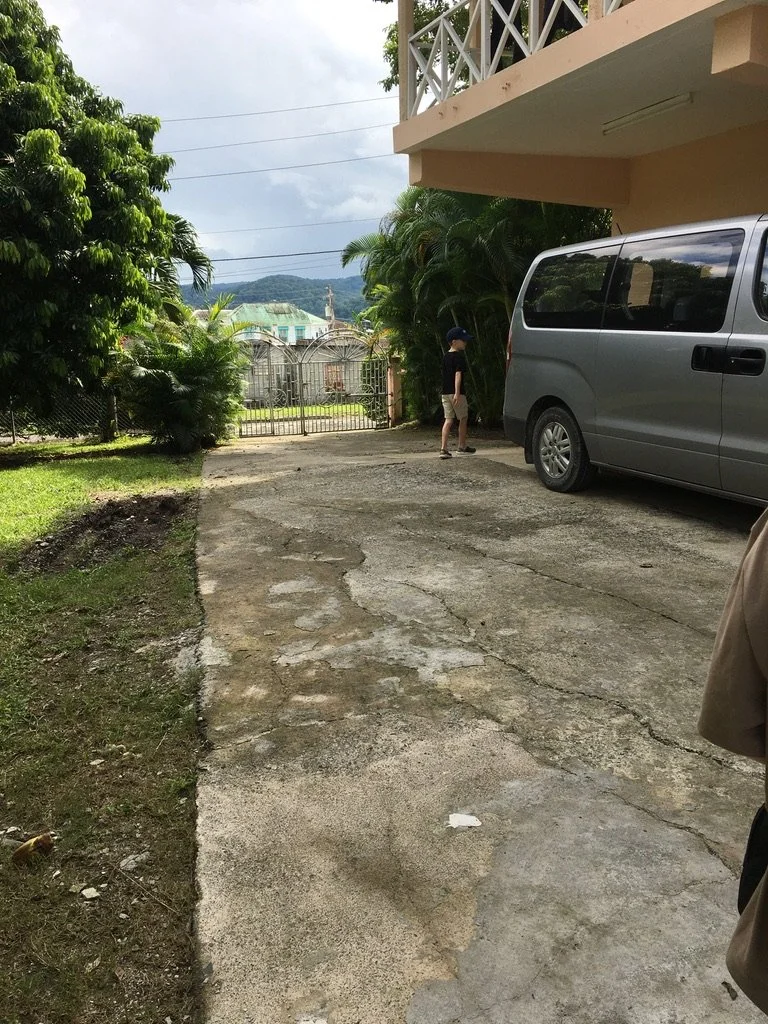

Above is Franco and Bernedetta, the oldest dog’s name is Zoé, but the kids had a soft spot for Davidé, whose birth defect, a slightly smaller lower jaw, often caused his tongue to stick out a little…
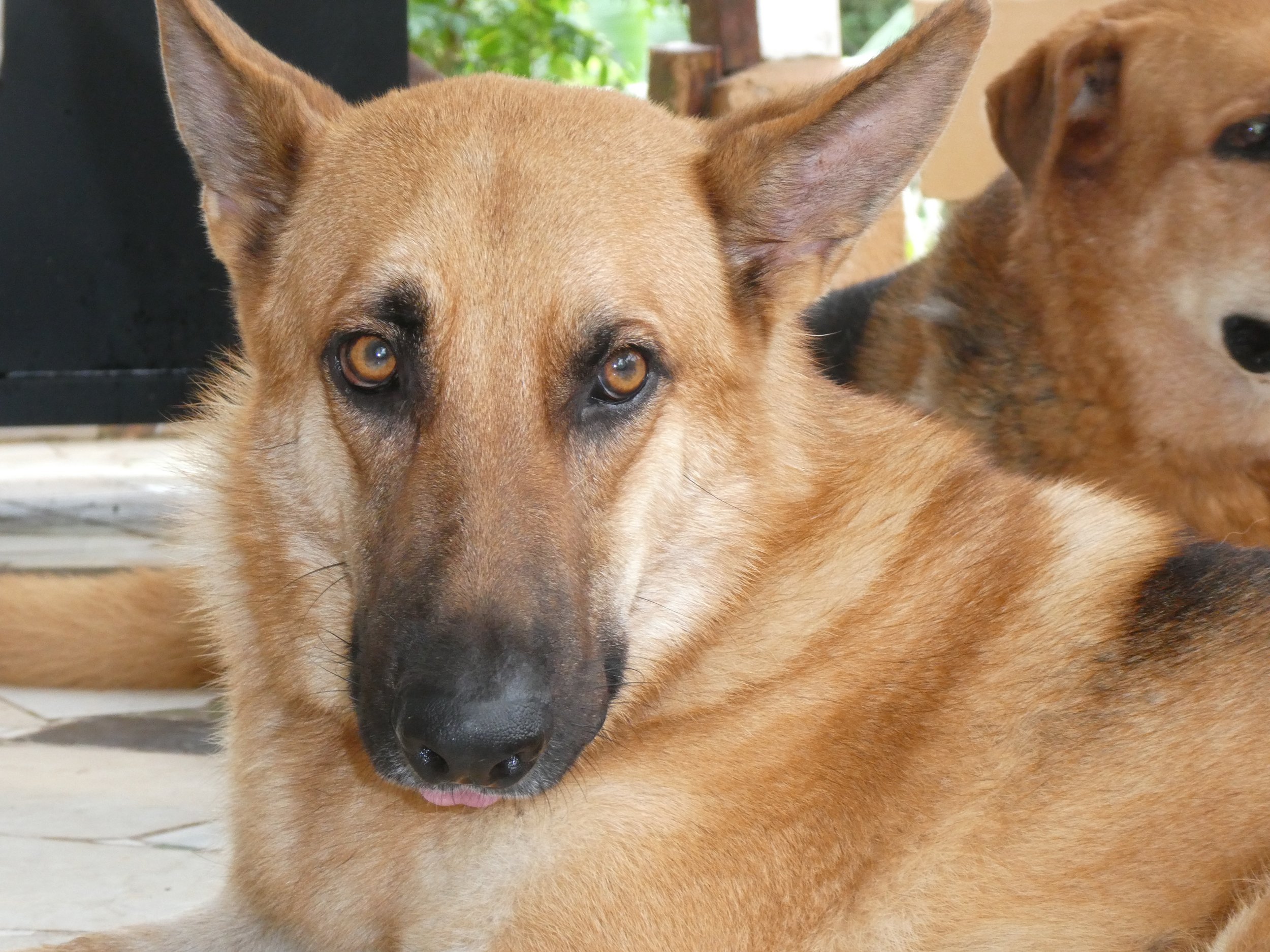

After 10 days with these giants, the kids find Enzo to be puppy-sized and have taken to calling him Tiny.

We spent time at Frenchman’s Cove, where a chilly river flows into a warm ocean bay.

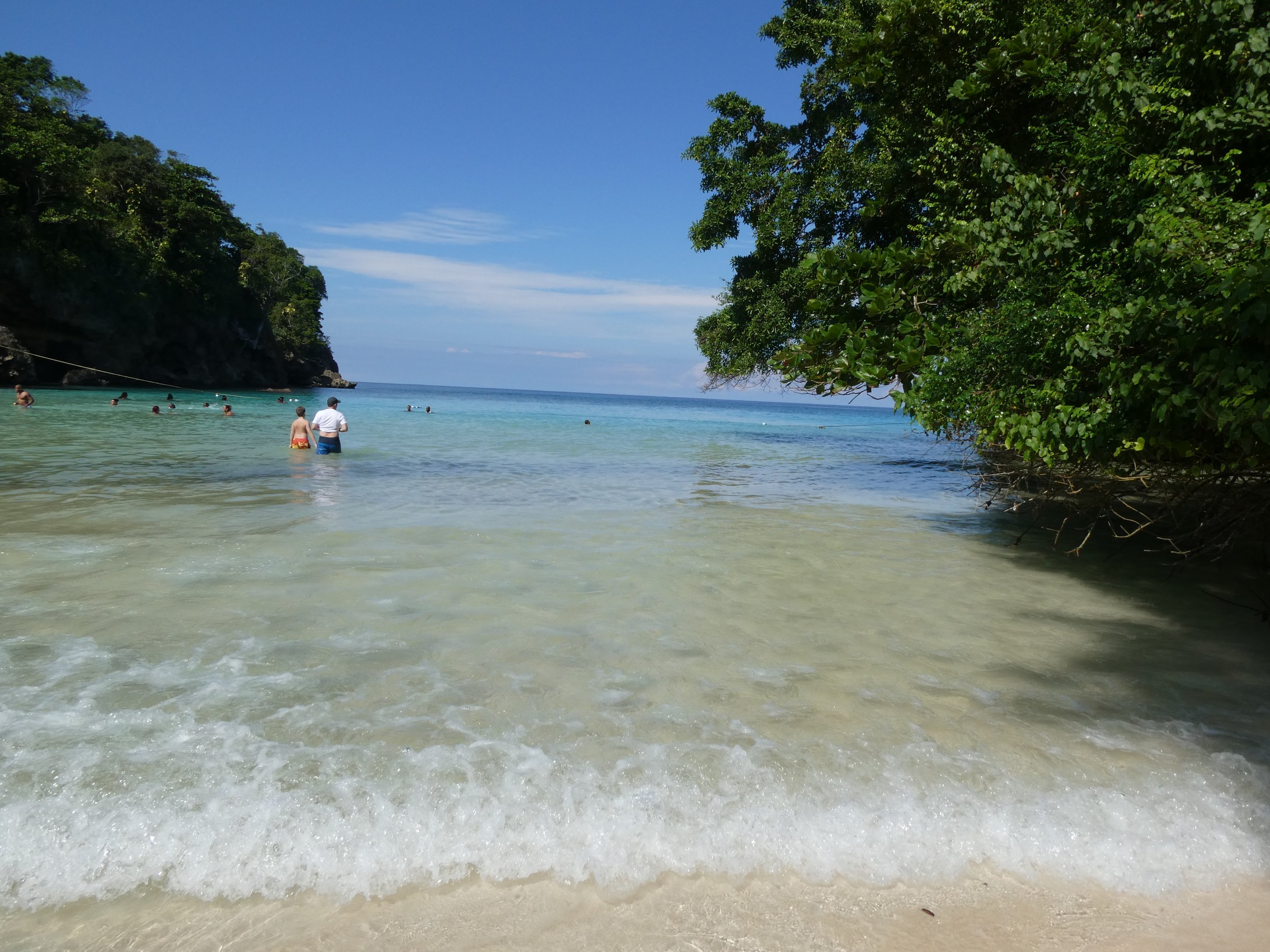
We were guests at a parishioner’s whose house in San San, up on the side of the mountain, offered a stunning view of limitless ocean.

Now, Errol Flynn, besides having a marina, apparently “popularized trips down rivers on bamboo rafts” (Wikipedia) and we took such a trip, which was a pleasant three hours, on one of the many Spanish-named rivers in Jamaica, the Rio Grande.

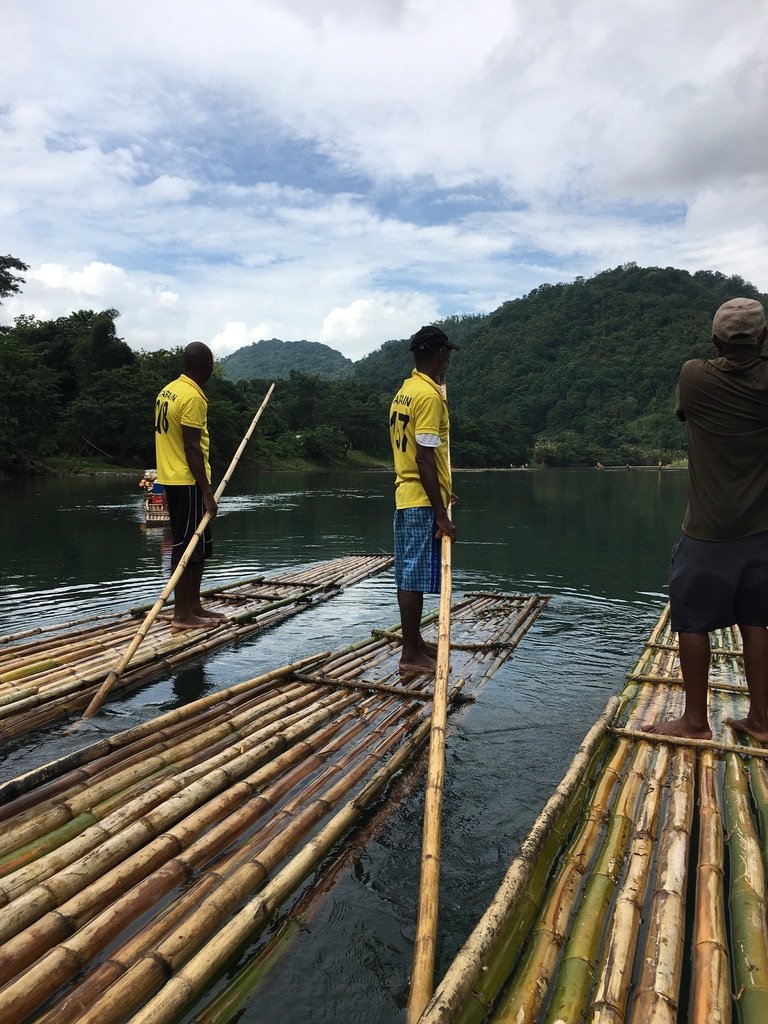


Christian even took a turn being Captain for awhile…
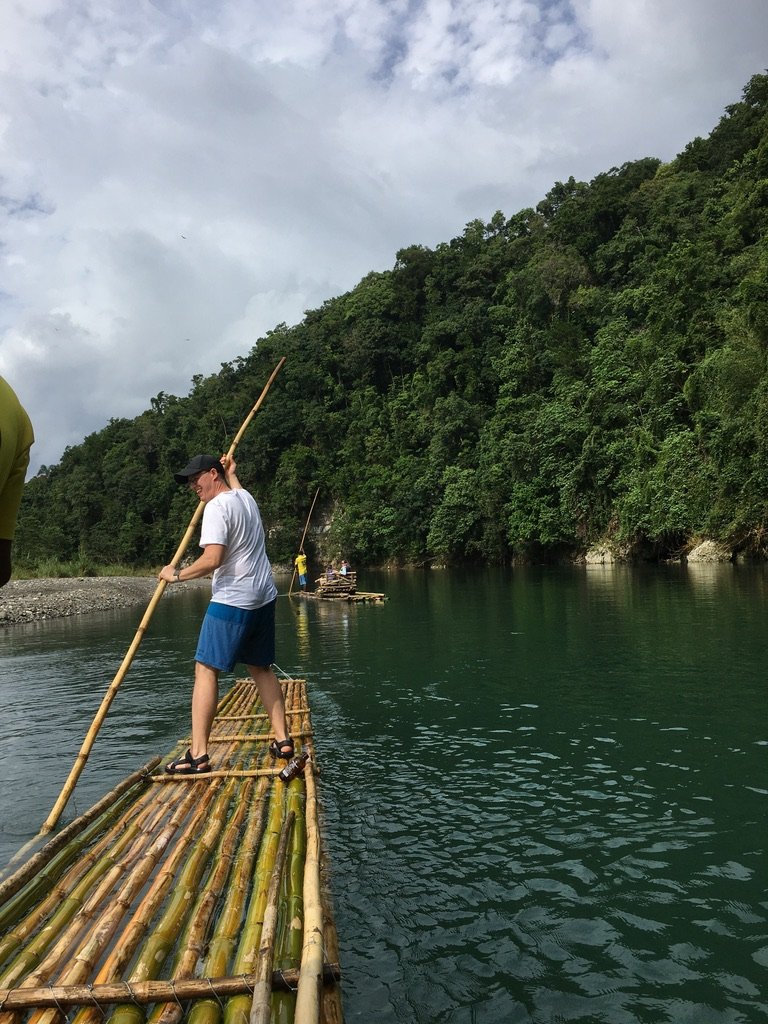
It rained while we were visiting, but only three days of the ten had dampened plans. One day we ventured out for lunch and hustled to find shelter to eat our KFC. A stray dog found us and we fed it scraps…

On another sight-seeing expedition, Michel took us into the mountains to visit a church and school in Avocat:
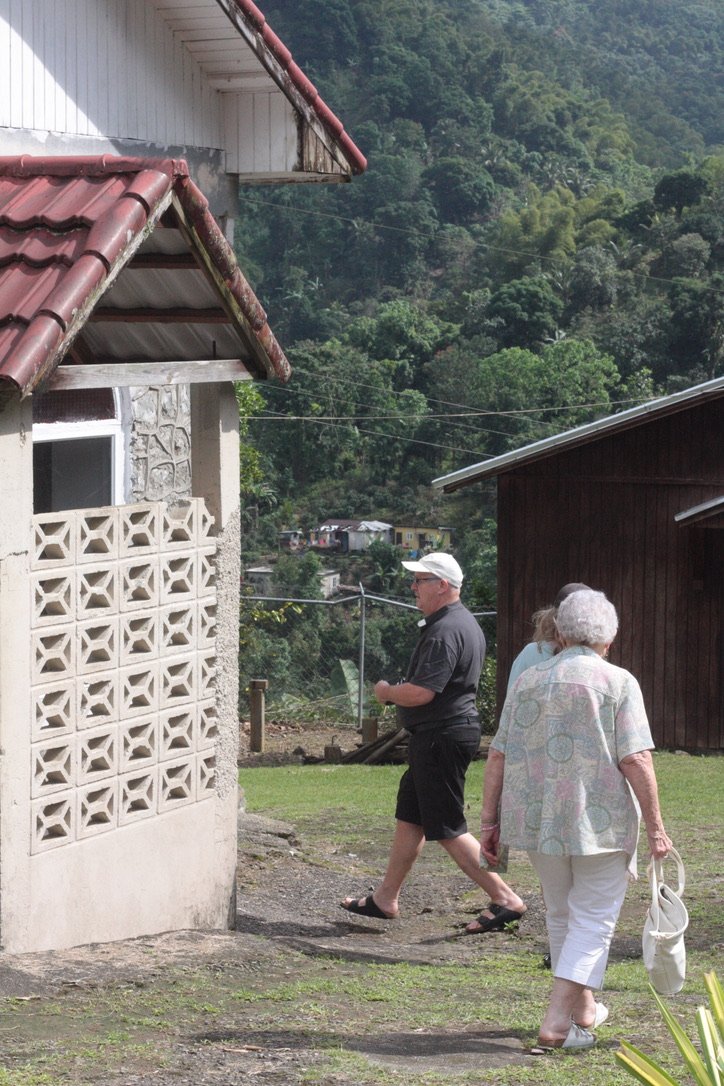



And then we visited one of the many places that grows famous Blue Mountain coffee… This one, Devon’s Coffee Ranch (website), gave us a tour and we learned a lot about coffee and drank a delicious cup.
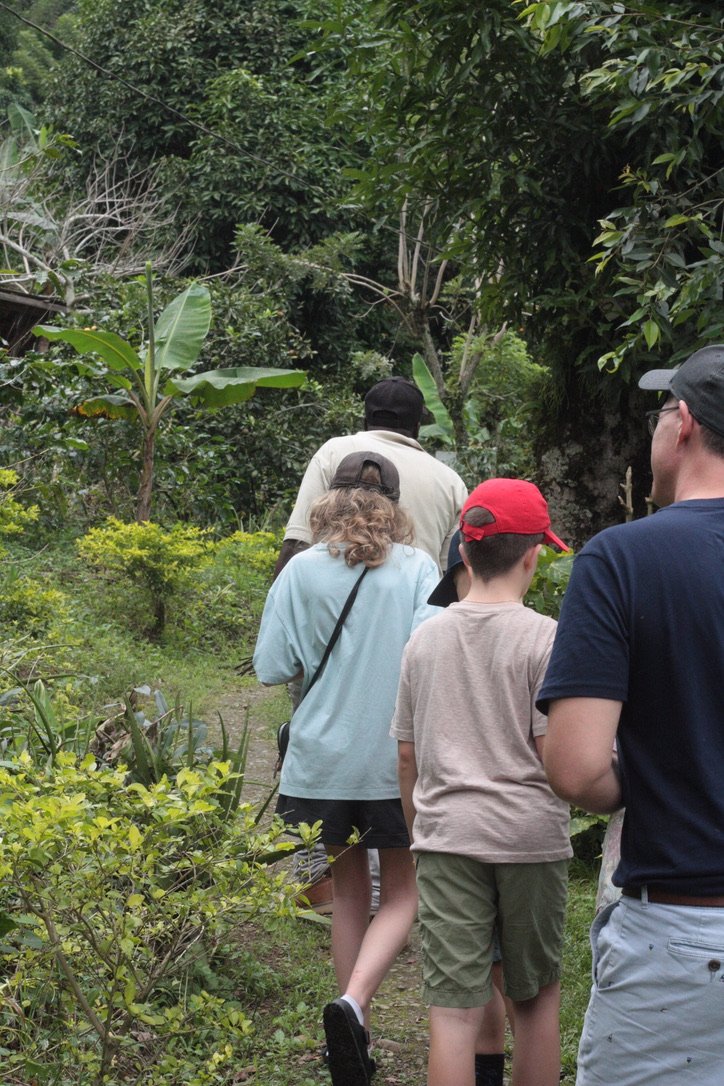
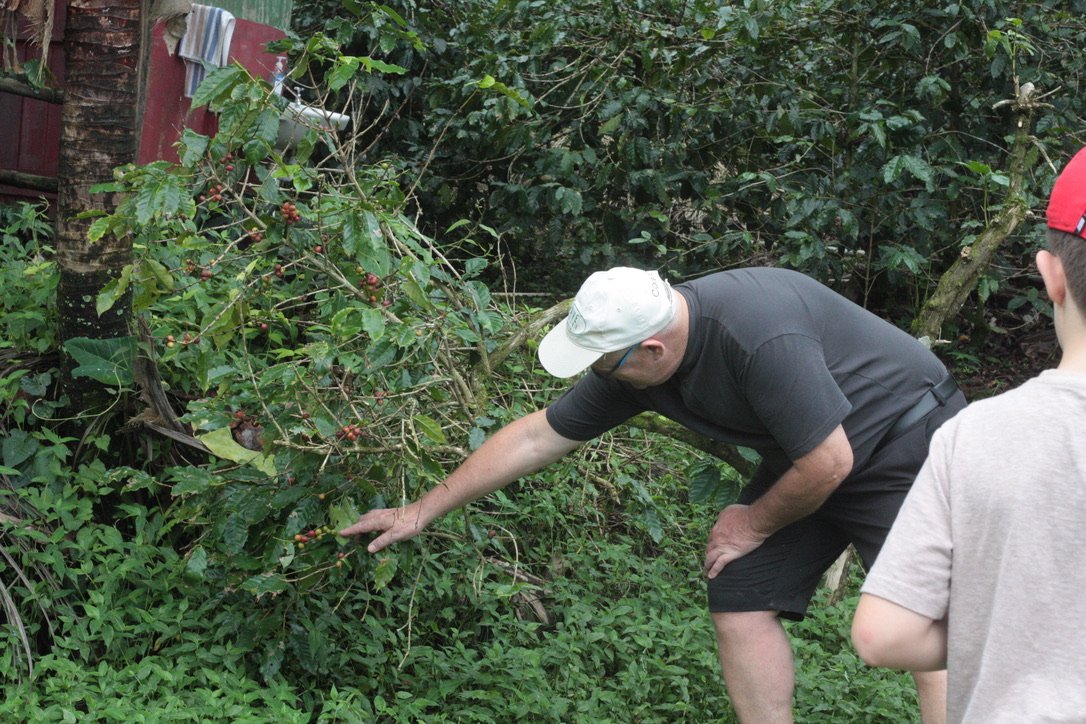

The coffee was for adults, but the kids were offered fresh oranges, so sweet and succulent that we took some too, and this was the view:

We had lunch, higher up the mountain, at a place called Blue Patio.

And Michel took us even higher into the mountain until the view became greenery and clouds…
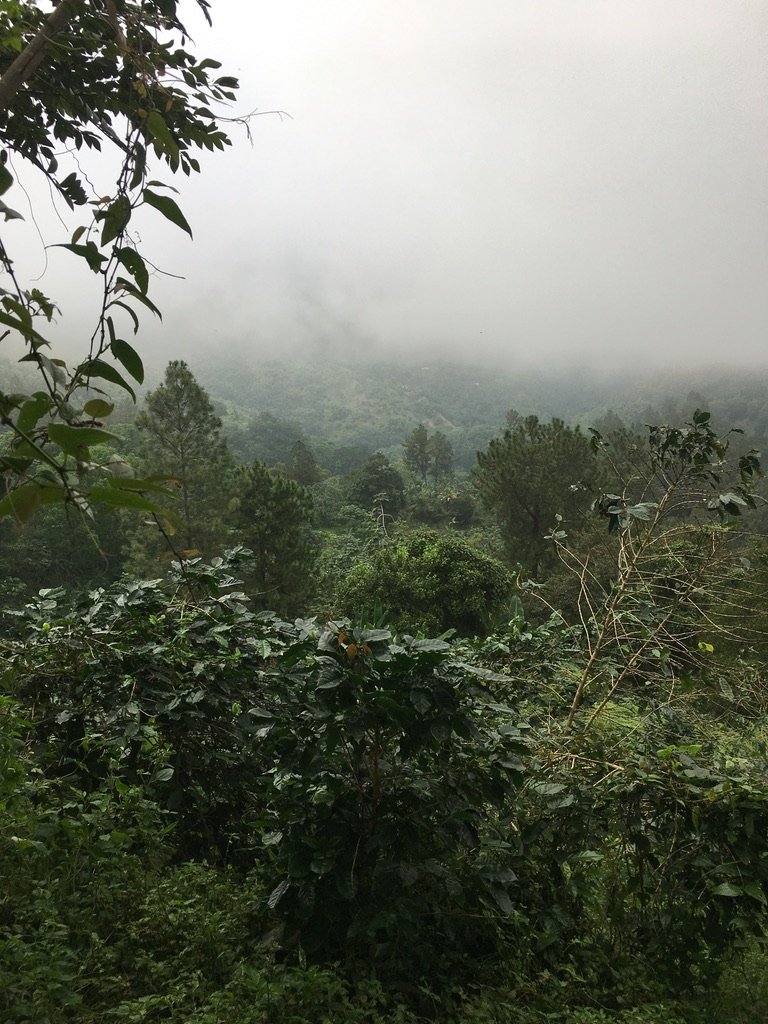
And since they would not part, we came back down.
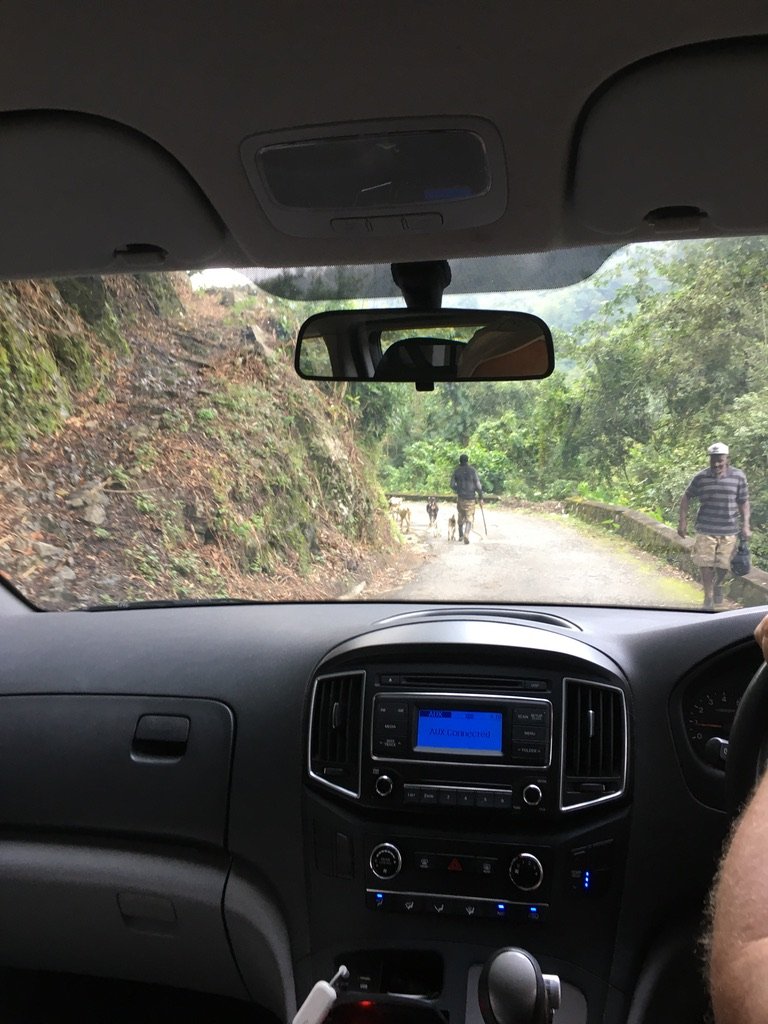
Another day, we went looking for souvenirs and found them at the Craft Market.

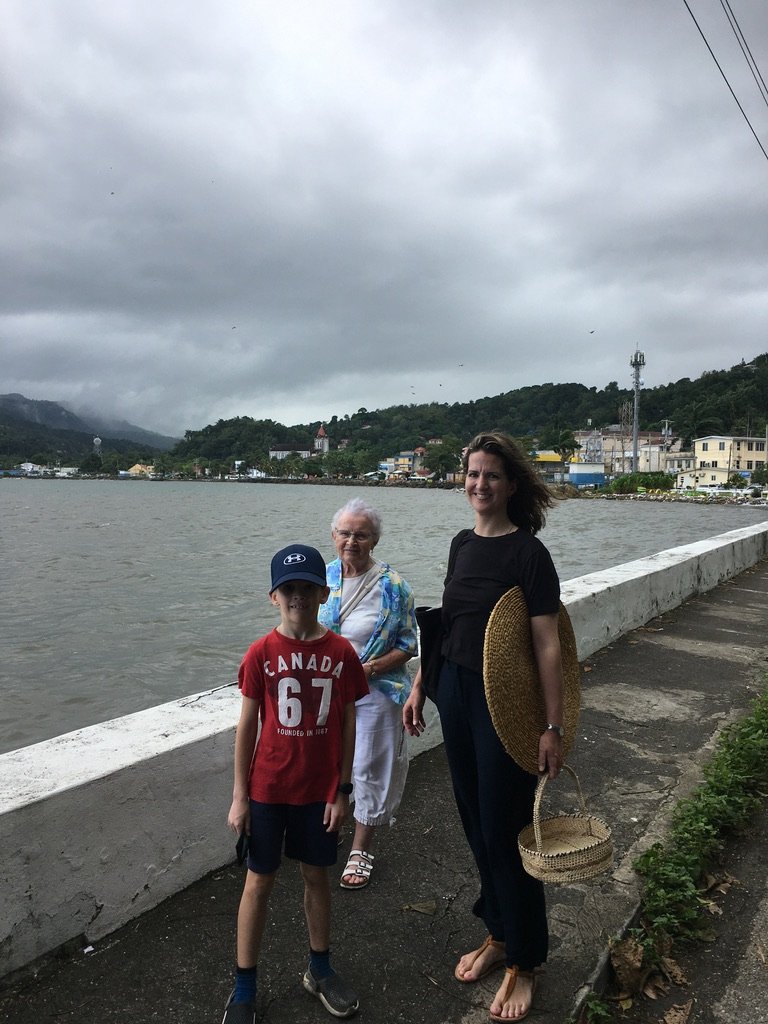
The day before leaving, Michel took us to Boston Beach…
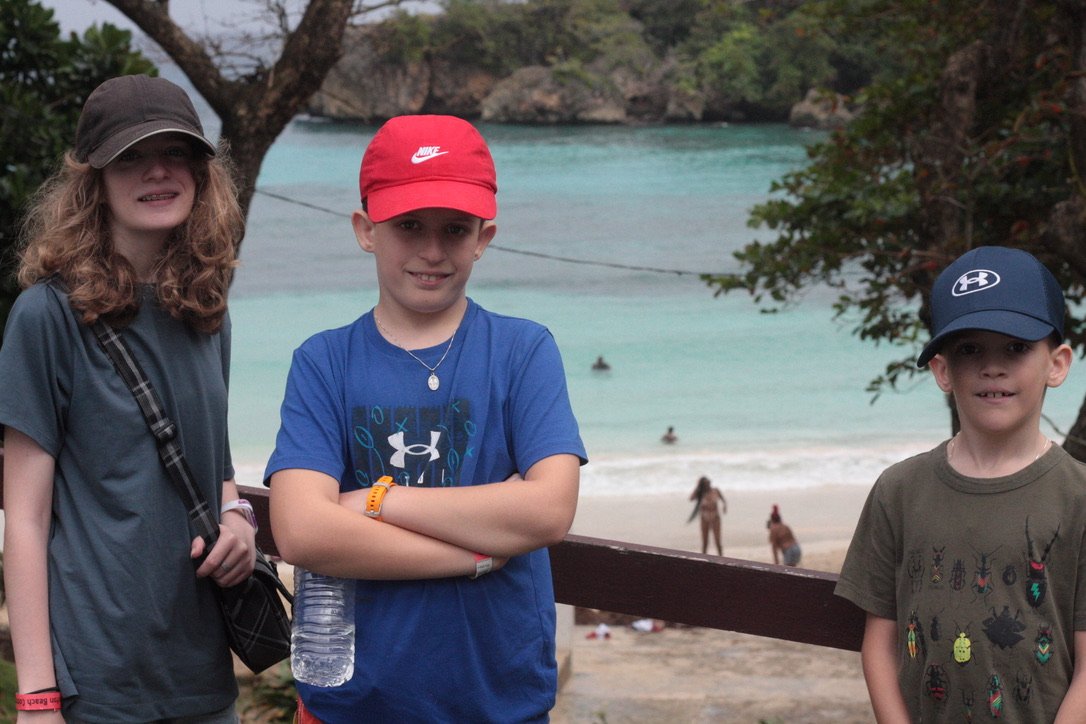
…where the highlight was the waves:
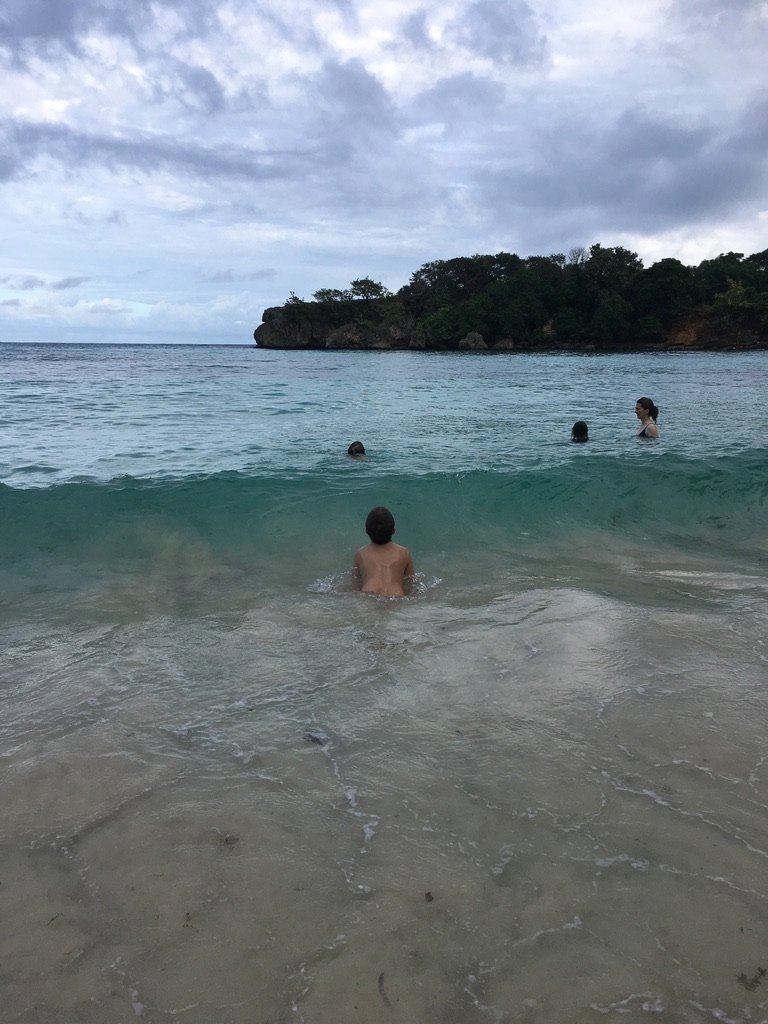
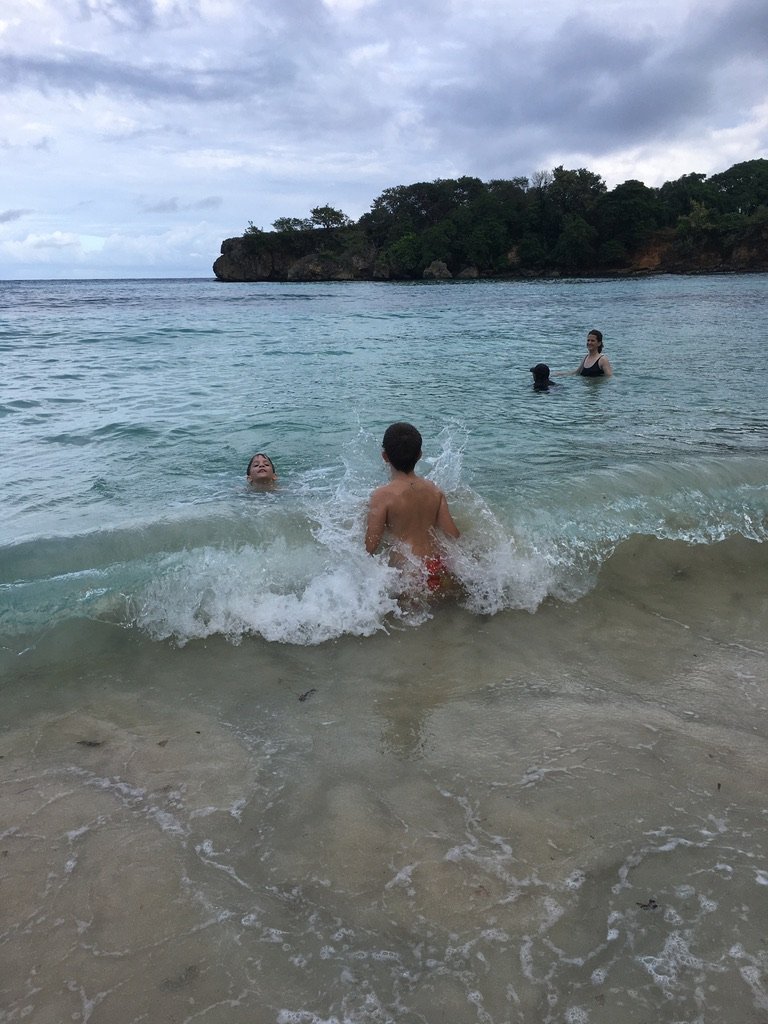
And Cedric built a castle.
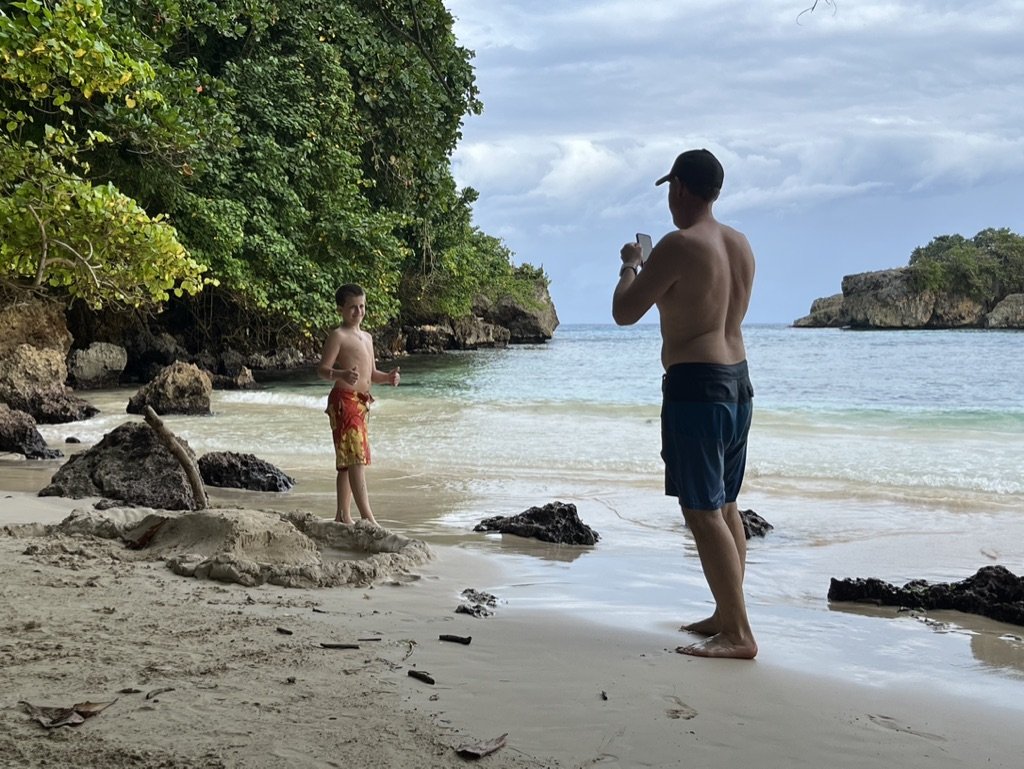
Then it was evening and we took a group picture, had supper and went to bed for the next day’s early start of driving and flights back home.

Jamaica, it was a treat!

On October 10th 2023, my Aunt Carole passed away. She was 75, and as her brother writes, “her cancer returned with complications.” She was predeceased by her parents (my grandparents) Leopold Buteau (1918-1999) and Philippine Maillet (1922-2007) and her brother, Gaetan (1949-2022). She was married to Joe Finella.
I have lots of fond memories of Aunt Carole, who was also my godmother. Looking back at photos from our childhood, there’s a record of our visits over the years, the times we travelled the thousands of miles between Saskatchewan and Ontario.

For a few years, as the oldest and only grandchild on my mom’s side of the family, I was showered with attention. When I was a baby, Grandma, Grandpa, Aunt Carole and Uncle Joe came to Saskatoon. A little older, Mom, Pa and I went to Ontario.

I was showered with attention… and gifts…

When my siblings came along, there was still just as much attention, just as many gifts. As the holidays approached, we would get these giant boxes full of gifts for under the tree, and baked goodies. Mom didn’t bake cookies, but Grandma and Aunt Carole made it completely unnecessary for her to do so… I remember Whipped Shortbread Cookies, Peanut Butter Rice Crispie Squares, Fruitcake Cookies, Jam Thumbprints, Peanut Butter Cookies, Molasses Cookies, Snowball Cookies, and Pecan Loaf.

Aunt Carole, and Uncle Joe with her, was a welcoming host. Here, recently moved into a new home, she sent my mom this polaroid with the caption in her signature handwriting:

And we came!

And we stayed in Aunt Carole’s impeccably decorated house:

I can so easily recall Aunt Carole’s voice, her cheerfulness with us kids and her self-deprecating humor. This polaroid is a little example… it is one of a series of polaroids showing my parents Uncle Joe’s new building. She didn’t take the shot since she’s inadvertently in it…

Aunt Carole and Uncle Joe welcomed me again, in 2004 when, on my way to Manitoba from Quebec, I stayed awhile at their place in Grimsby. During my stay, she taught me how to crochet and read crochet patterns, a skill I still practice and one that helped me pass the time during the pandemic when the kids were doing school online. Looking at photos, I spy my Aunt’s handiwork throughout our childhood home… My bedroom, pictured here when I was in grade 6, (my little brother is the cute intruder) features FOUR crochet blankets!

Aunt Carole was a charming, cozifying presence as I was growing up and it was a privilege to be able to attend her funeral on the 16th. The 24 hours I spent in Niagara Falls, visiting the horseshoe falls, meeting Uncle Joe’s side of the family, and hurrying home to be back at my post for my own kids, felt like an appropriate way of paying homage to my Aunt who admired what was beautiful and showed a faithful devotion to family. If I could say one thing to my Aunt Carole, it would be Thank-you!
The kids are in school and the house is quiet. This week, after a summer of research and reading, I started writing the next chapters in this thesis on the history of Aubigny. I love research, but it’s always in service of writing, because writing is that wonderful creative part where all the information I’ve been squirrelling away now gets to be arranged and set to a page. When I can’t write, I come here to play with words and set thoughts afloat. But now I’m busy writing elsewhere, so writing here would become a chore, which makes me a bore. I think this blog post on Kottke helped me clarify these feelings.
I was reading a book by Pierre Berton titled The Promised Land, in which Clifford Sifton (the Minister for the Interior in charge of getting immigrants settled across the prairies) is described this way:
Sifton took office with the reputation of being an iron man. In the words of an admirer, ‘he never gets tired, works like a horse, never worries, eats three square meals a day and at night could go to sleep on a nail keg.’ During the Manitoba provincial campaign of 1896 he would climb off the train at Brandon at eleven at night, sit up until morning talking politics with friends, entertain at breakfast, and then take off in the winter’s cold by sleigh, speaking at Souris, say, in the afternoon, and Hartney at night before heading off to the railhead at Oak Lake to catch the train back home. (p. 19)
When he resigned in 1904, the author writes that his “nerves were badly shattered” and that
As soon as he had cleaned up the backlog of work in his office […], he left Ottawa […] for treatment in the mud and sulpho lithia water baths of the Indiana Springs Company at Mudlavia. (p 196)
(Pause… First off, Mudlavia! Fascinating! I had no idea… and then, of course, why wouldn’t there be spa treatments in 1904, just as there have been forever? Still, when Louis Litt’s devotion to mudding is shown in the tv series Suits, I thought it was exotic and new.)
Pierre Berton goes on to write about Sifton’s resignation, and I can’t help but feel like he’s poking fun at these mud baths:
It is difficult to picture the imperturbable Sifton […] emerging with nerves shaken so badly he was forced to immerse himself in mud for the best part of two months. (p 197)
Granted, Berton is writing in 1984, and he definitely wasn’t a millennial.
Our rhubarb plant produces rhubarb from spring till fall and before the first frost I make as many loafs of Rhubarb Nut Bread as I have time for. I am fond of a recipe I found years ago while working as a secretary by day and learning to bake by night. It’s from The Angel of the Sea Cookbook, which is still operating as a real bed and breakfast. (It looks so pretty!)
When I’m reading, reading, reading for research, I notice that I don’t read much just for fun, and turn instead to audiobooks for a change. This summer I’ve enjoyed S.P.Q.R. by Mary Beard, Patrick Radden Keefe's Empire of Pain, Susan Orlean's On Animals and The Nineties by Chuck Klosterman.
I heartily agree with this advice from a librarian quoted on Recommendo: "Ditch Audible and get a library card to listen to free audiobooks. Many libraries offer apps where you can download audiobooks straight to your phone."

I love how the thistles, still drying from the dew, look wonderfully dishevelled.
Psst: Happy Friday!
This is the last in this series, but I’ll still pop in, with perhaps a different kind of post because I like this blog as a digital record of thoughts and experiences over time… Cheers!
It's Friday and the dreary weather here is pushing us along towards accepting that summer is coming to an end and school is about to begin. Somewhere I read advice about "writing what you would want to read" and since I love finding useful resources online, here are a few...
Understanding oneself is a funny thing because one can be nearing 40 and still learning that transitions are tough... I think that's why I appreciate McKinley Valentine's newsletter The Whippet, where, besides learning about stuff, I can come across an observation like "I sometimes think the biggest difference between super-successful people and the rest of us is how easily they transition" that makes me think long after I've left my e-mail.
Austin Kleon's newsletter today linked to a quote by Lauren Groff who explains why I sometimes have trouble sitting down to write even this measly little post: “The ‘fear of imperfection, which can be combatted by a writer carefully training herself to let her work be messy and impermanent.’”
And Recommendo lead me to Mari Andrew's delightful list of "100 Things I Know".
Between the statements "I need clothes" and "I want to develop my sense of style" lays a canyon of advice (trails), marketing (views) and contradiction (you could get lost). Having the authoritative voice of a friendly guide like Becky Malinsky means the venture might be (kinda?) feasible (i.e. I think I'll buy some Levi's this fall...).
Also, it made me chuckle to see this headline "Packing Light? Not for me, thanks" after having read Ann Mashburn's essay "Take It or Leave It"
Christian and I turned the summer's blockbusters into a date night scheduled every Tuesday over three weeks. We brought our own drinks and snacks and participated in the pop culture moment along with the rest of the audience and delivered our star-ratings to our kids next morning. Fun!
I made corn fritters this week, from a cookbook I've had for a few years now. It sometimes takes me awhile to get around to things, but this picture of a note scribbled on top of the recipe title stuck in my mind. I'm not sure if I could call it a haunting... Catherine Newman's scribbled "so f-ing good" never left my mind... When I went back in her blog archives to find it I realized this mental note had been hanging on since 2018. Good grief. (As an aside, I've often turned to the Ben and Birdy blog for gifts or entertainment ideas. The recommendations are perennial.)
This is our garden... it has yielded beans, cucumbers and zucchini, and lately, carrots! Funny squat carrots that we've mixed into lamb ragu and pulsed into Muhammara.


These are our dog’s nacho-smelling paws.

This is a neglected bouquet turned still life.

This is a fun children's book I found in the University of Manitoba's Icelandic collection.
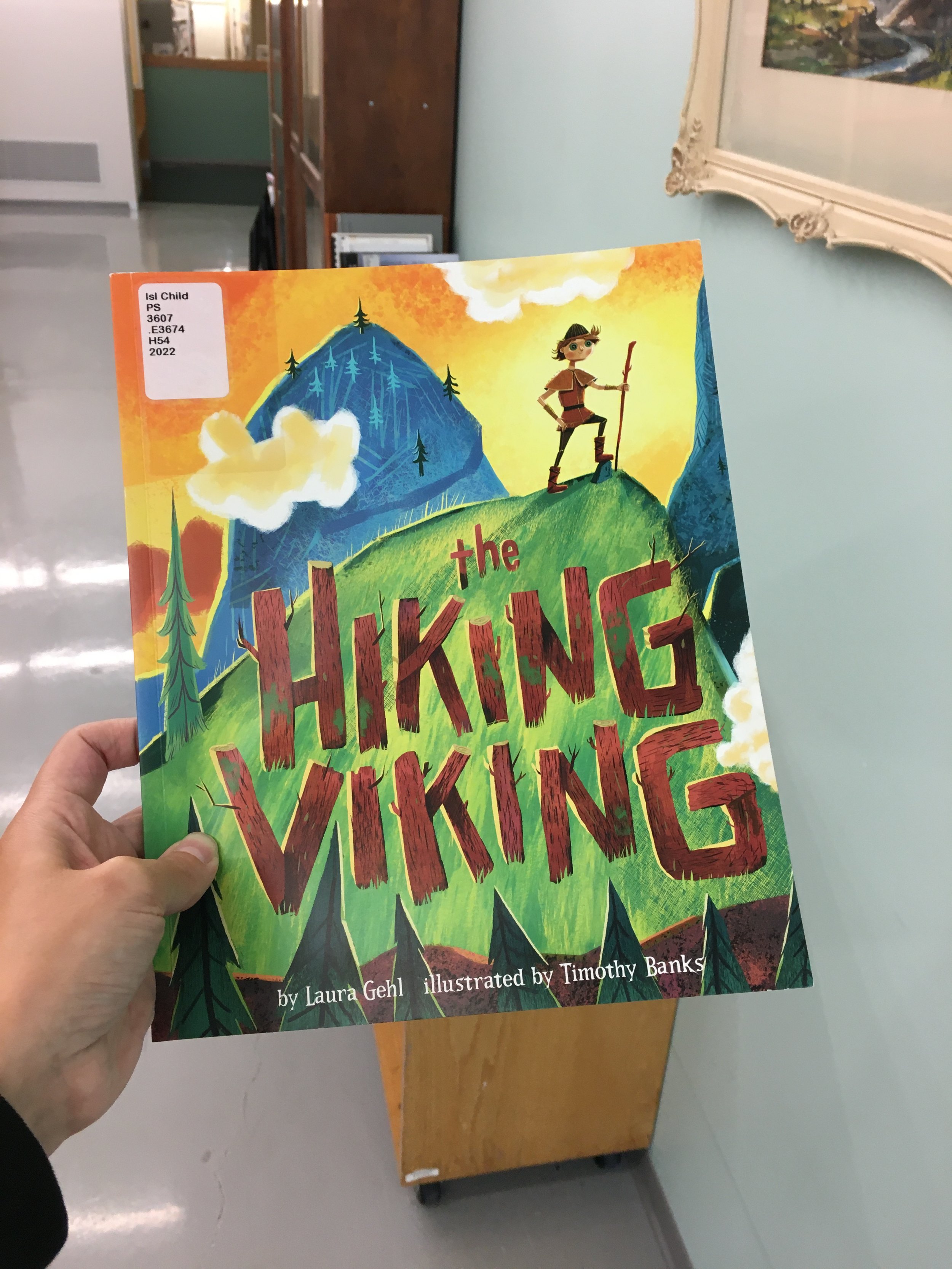
Oh! And the drama last week of seeing a building on fire:

Last week we took a daytrip to Stonewall. The town and quarry are associated with Carol Shield's book, The Stone Diaries, the way Prince Edward Island and Lucy Maud Montgomery's Anne of Green Gables are associated. It's funny, you know... a few weeks ago, I followed a link to this essay titled "The Case Against Travel" in which Agnes Callard writes: "And, although people like to talk about their travels, few of us like to listen to them. Such talk resembles academic writing and reports of dreams: forms of communication driven more by the needs of the producer than the consumer." She's not wrong, except that I wish what she said about academic writing were not so generally true. But I digress...
I'm not writing about the trip to Stonewall, although, look, here's a nice picture...

While Callard made a case against travel, and I'm nodding along with her argument, Tyler Cowen wrote: "Travel makes you a better reader, especially for history, geography, (factual) economics, and political science." And instantly, I agree... this dish we are cooking on the subject of travel just got more exciting. You wouldn't call a short day trip outside of Winnipeg "travel" really... not much beyond a lunch was packed, no passport photos were taken, but when I go and re-read the notes I'd taken from The Stone Diaries all those years ago, there is a bit of that feeling of travel...
In The Stone Diaries, Shields writes this long bit that I can't bear to cut down any shorter than this...
It has never been easy for me to understand the obliteration of time, to accept, as others seem to do, the swelling and corresponding shrinkage of seasons or the conscious acceptance that one year has ended and another begun. There is something here that speaks of our essential helplessness and how the greater substance of our lives is bound up with waste and opacity. Even the sentence parts seize on the tongue, so that to say "Twelve years passed" is to deny the fact of biographical logic. How can so much time hold so little, how can it be taken from us? Months, weeks, days, hours misplaced - and the most precious time of life, too, when our bodies are at their greatest strength, and open, as they never will be again, to the onslaught of sensation. For twelve years, from age fourteen to twenty-six, my father, young Cuyler Goodwill, rose early, ate a bowl of oatmeal porridge, walked across the road to the quarry where he worked a nine-and-a-half-hour-day, then returned to the chill and meagerness of his parents' house and prepared for an early bed.
The recounting of a life is a cheat, of course; I admit the truth of this; even our own stories are obscenely distorted; it is a wonder really that we keep faith with the simple container of our existence. During that twelve-year period it is probable that my father's morning porridge was sometimes thin and sometimes thick. It is likely, too, that he rubbed up against the particulars of passion, snatched from overheard conversations with his fellow workers or the imperatives of puberty, or caught between the words of popular songs or rare draughts of strong drink. He did attend the annual Bachelor's Ball, he did shake the hand of Lord Stanley when the old fellow steam-whistled through in 1899. My father was not blind, despite the passivity of his youthful disposition, nor was he stupid. He must have looked about from time to time and observed that even in the dead heart of his parent's house there existed minor alterations of mood and varying tints of feeling. Nevertheless, twelve working years passed between the time he left school and the day he met and fell in love with Mercy Stone and found his life utterly changed. Miraculously changed.
Shields uses the expression "obliteration of time" and it feels as though Stonewall were a place where one can really feel this. In the newly-restored interpretive center, where upstairs, events like the local Garden Club's 60th "Flower, Fruit and Vegetable" show was occuring as we, downstairs were admiring a pillar of of geological layers that the sign was telling us was to be understood like a lasagne. First, a layer of stone for building, and below that, limestone, burned and used for quicklime, or calcium oxide, sandwiched between other layers, in an earth history that spirals out like a pencil shaving in which our period, the human one, is just the first traces of pencil lead in all that compression of time.
And yet, this magnificent idea, that in spite of "obliteration" there is this undeniable fact of presence. Sheilds writes:
Her mama's no more than a little itty bitty story in her life now, something from way, way back when, and that's the way my mama is for me. You can tell that story in five minutes flat. You can blink and miss it. But you can't make it go away. Your mama's inside you. You can feel her moving and breathing and sometimes you can hear her talking to you, saying the same things over and over, like watch out now, be careful, be good, now don't get yourself hurt.
Beautiful as those quotes from The Stone Diaries are, one of my favourite quotes from Carol Shields is a passage in Startle and Illuminate.
...by 1996, likely much earlier, Carol had achieved an important insight. Time was precious but it was not fleeting. She had raised a large family. She had published dozens of books. She had travelled. She had read. She had sustained a long marriage and empowering, delight-filled friendships. She had talked and laughed and shared ideas with thousands of people as friend, mother, teacher, mentor. She had written letters, scrubbed floors, dried tears, wrapped and unwrapped presents, picked flowers, baked pies, argued, danced, slept, wept - experienced that full range of what life has to offer. Her conclusion?
Tempus does not fugit.
Here's what she told the students that day:
"Time is not cruel. Given the good luck of a long healthy life, as most of us have, we have plenty. Plenty of time. We have time to try our new selves. Time to experiment. Time to dream and drift. Time even to waste. Fallow time. Shallow time.
"We'll have good years and bad years. And we can afford both. Every hour will not be filled with meaning and accomplishment as the world measures such things but there will be compensating hours so rich, so full, so humanly satisfying that we will become partners with time and not victims of it."
Our short trip occasioned this revisiting of an author's work, and a focus on Shields' contemplation of time, in fiction and nonfiction. It brings me back to the two first points above, on travel. Callard's essay inspired many responses, among which is Ross Douthat's opinion piece "The Case for Tourism". At one point, his argument echoes Cowen's "travel makes you a better reader". He writes:
The longtime reader of Jane Austen who wanders the grounds of a Georgian mansion, the history buff who touches the crumbling stones of Hadrian’s Wall, the parent who has read “The Tale of Jemima Puddle-Duck” a hundred times but now stands in Beatrix Potter’s rain-drenched garden — all of these travelers are enjoying an extension of their education, a deepening of their knowledge (...).
All that being said, Happy Friday!
Welcome to this week’s edition, which happens to bring you five interesting bits loosely related to weather! Let’s jump in!
The sun is shining, there's an afternoon at the beach planned, Audiomachine's "The Big Smoke" is playing in my ears while far away, the news tells me, a chart-topping amount of forest hectares are burning. Transcending weather and anxieties there is good advice, and I especially appreciated The Marginalian's overview of Kevin Kelly's most recent book. Maria Popova does a great job of offering readers a website full of these gems of reflection.
Currently, I'm reading Pierre Berton's The Promised Land: Settling the West 1896-1914, in which he describes Manitoba's premier, Clifford Sifton's efforts to "dispel the image of the West as a snow-covered desert". Berton writes:
One of Sifton's first moves was to try to ban the daily publication of Manitoba temperatures, but since that might prove even more alarming, he dropped the idea. Nevertheless, snow was never mentioned in the blizzard of pamphlets his department issued. (p 15)
Get it? Snow mentioned and blizzard of pamphlets? Berton made me laugh. He continues:
“Cold” was another taboo word. The accepted adjectives were “bracing” and “invigorating.” (...) “The kindest thing to say about it is that the literature was a little on the optimistic side,” one British immigrant recalled. “Canada was said to have a healthy climate guaranteed to be free of malaria. One has to admit that this was true. It was said that while the prairie summers were hot, the heat was delightfully invigorating and while it got cold in the winter the cold was dry and not unpleasant. I used to recall those glowing words as I pirched sheaves with the temperature at 95 in the shade, and as I ran behind the slight at 30 below to keep from freezing.” (p 16-17).
This week, working at the historical society, I would eat lunch in my car to warm up from their excellently air-conditioned rooms. But modern conveniences and jobs that don't require manual labour do not make weather any less of a topic of conversation.
I would like to defy expectations here and avoid superlatives around seasonal tomatoes in order to highlight the luscious bunch of red swiss chard I picked up at the market for 2.70$. It was the main vegetable for Deb Perelman's "Swiss Chard Enchiladas" from Keepers. They were delicious, but more importantly, this is a recipe that makes it easy to consume a vegetable I would otherwise not buy.
This quote from an article by Charles Eisenstein, highlighted in the wonderful newsletter Dense Discovery, feels true.
No one calculates their way into love. And the changes that we will need to make to restore earth’s aliveness from its current depletion will require a degree of courage and sacrifice that comes only from love.
Welcome to our yard where we have collected perennials and shrubs and cedars and filled in their gaps with colourful annuals.

I don’t really plan which annuals I plant from year to year and so the flowerbed can offer serendipitous surprises from one season to the next…

A patch of violets that look especially whimsical hidden among the fronds of big lilies. Or the unexpected colour and texture combination here…

Rain and days of cooler temperatures make these petunias and begonias look especially luscious this year…

There aren’t just flowers in the yard though…

Happy Friday!
I’m reading lots of academic books in order to write my own academic blah-blah-blah. A few weeks ago, I was struck by the friction I felt getting back “into” this mode of reading, absorbing and digesting this information in order to benefit from the exercise. I think that’s why, this comment on “cognitive patience” struck a chord as I was listening to this episode of the Ezra Klein Show in which Maryanne Wolf says:
Everything I have done, which was meant to be an apologia for reading, led me to a darker insight, which is that the very act of reading has become so degraded because of the bombardment of information, because of the affordances of the particular medium, and because we have become all, all of us cognitively impatient. We don’t want to spend the time.
so I really appreciated this video that explains why trees are so hard! Steven Travers makes such good points!
Our garden has produced an abundance of beans. That might be Mr. Gardener's fault (maybe don't plant so many darn beans? I tease!). They're not as versatile as zucchini, which can be baked into loaves and frozen for future zucchini-loaf cravings. Beans are their own standout ingredient. They need to be tenderly blanched and carefully dried before being frozen in order to be enjoyed mid-winter, and still, even then, they're not quite as magical as when they're freshly cooked... slathered in butter, sprinkled with salt... This week, I sliced them up, cooked them and added them to fried ground pork and served that over rice. No real recipe, but a kind of toned-down variation of this.
Check out our home-made decorations!

Psst! Happy Friday!
Planning a birthday party is fun. First, some decoration… “What’s the theme?” I asked the birthday boy. “Water fight!” he said. So here’s his age, making a splash:

And here’s a watermelon whale, which doubles as decoration, and optional healthy snack:
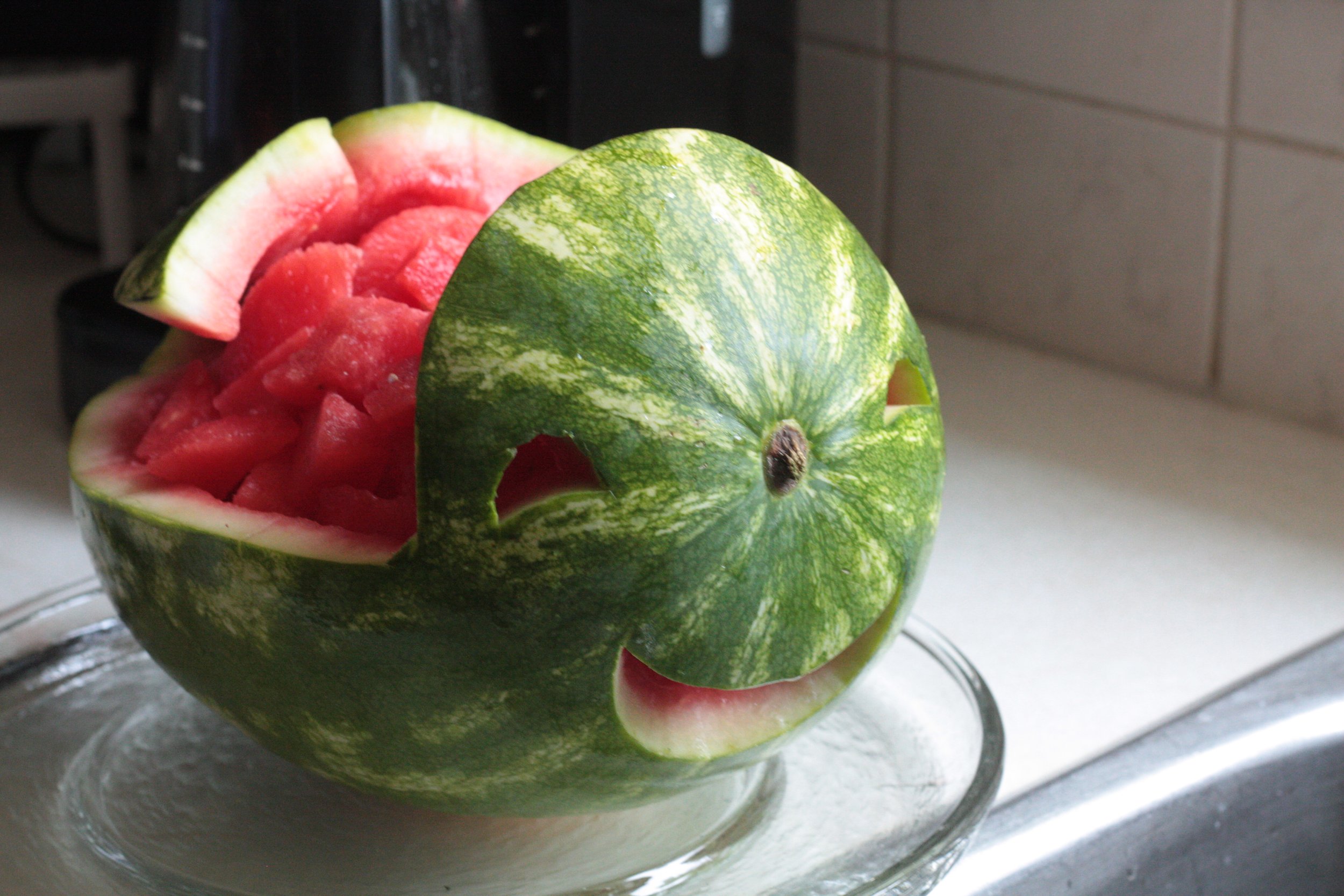
And then, if the party guests don’t eat all that much watermelon, you can take it and throw it in the blender and make watermelonade, one batch for kids, and one, with Prosecco, for the adults:
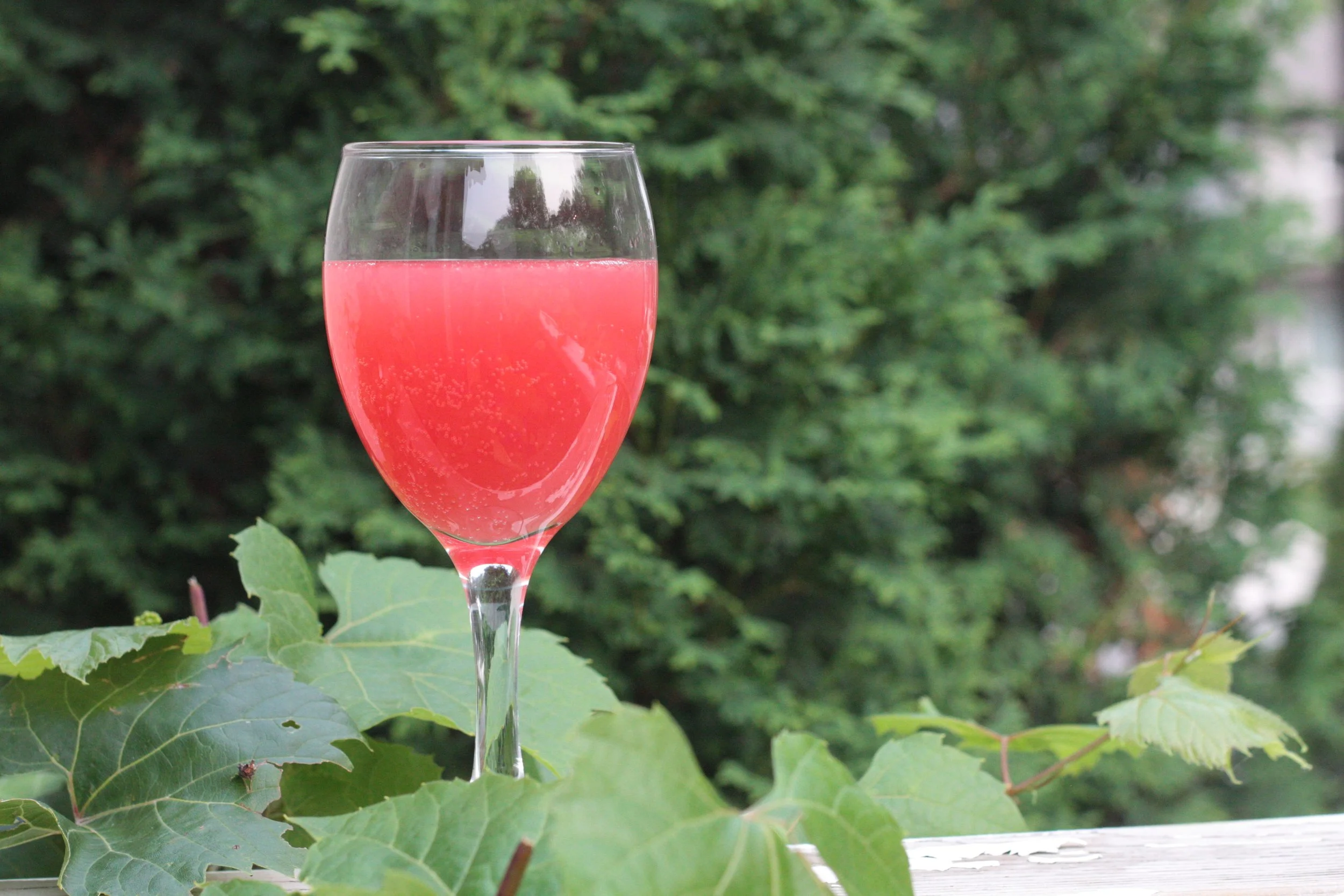
And here’s what Enzo thinks of having to be tied up while his domain is invaded by elementary-school children:

Party favours included these fun erasable pens from Toad Hall toys:

But most of all, it’s just keeping things simple and letting the kids have fun!
A spider just drifted by and I let it be, floating on its piece of silk, because, I think, I should let bugs live. But when the ambient air in this big-windowed study room moves a stray hair against my cheek, I think "spider?" But no, it's now landed and is exploring the floor...
Today, I give you no weighty thoughts, no facts or quotes, just this leftover feeling... Yesterday, I broke my self-imposed week-time routine to take the day and celebrate my brother-in-law's birthday. We packed a picnic and spent all afternoon at Assiniboine Park, visiting the Leaf, getting ice cream across the bridge at Sargent Sundae, and touring the English Garden and Leo Mol's sculpture garden. Besides the fact that the outing was itself really nice, that it pleased the generational span of our family and that everything went smoothly, it was also the momentary release of choosing to take the day off without setting any expectation on it that brought a "relaxing into the moment" kind of happiness I wasn't expecting. But I think that contrary to the impulse of wanting to chase that "relief from routine" feeling, it only reinforces (for me) the benefit of having a discipline to help me with this isolated - and isolating - kind of pursuit. I'm happier when I consciously dedicate time to both.
This is the hat-wearing contingent of our little group headed over to get a treat. I'm really grateful to the city for maintaining such pretty gardens in the summer!

The beginning of the week, and most of the month of July so far, has been unusually cold. After a decadent supper with relatives, we had Christian's brother and mother over for Fish Stew on Sunday. Fish stew doesn't sound appetizing, but I can always trust Nigella Lawson to win me over to something over the course of one lengthy recipe introduction or another... This one, she promised, would resolve my "fissues", and just being provoked to lol, I decided to take on almost two pounds of cod.
Sometimes, I think, it's not about the recipe itself that I want to devote all my enthusiastic writing... sometimes it's better to just appreciate the "a-propos"-ness of food. The supper felt like a healthy pause in the midst of going-out extravagance and it felt warm against the chill. I appreciated it for that.
Yesterday, it was warm, and sunny, and after a day of walking around gardens and plants, we had salade nicoise, just to catch up on all the wax beans our garden has been producing. The day before, I'd said to Christian "maybe plant fewer beans next year?" A second and third serving of the salad and my mind thinks maybe I should hit "backspace" on the comment. Before assembling the salad, I made a riff on this Antipasti by Grossy Pelosi. (What? A salad before a salad? Ah! It's summer dear!)
I'm new to listening to Hard Fork, and press play whether or not I understand the episode titles, only to feel like I'm always learning something new about AI and feeling a little smarter for it. There's a gap between appreciating new ideas and actually being able to explain them to someone else, but still, hosts that help pierce the nebulous nature of this technology are to be commended! (And hey! I learned about the Effort Heuristic!)
From the beautifully manicured Assiniboine gardens, to the lightly-maintained Henteleff, here are thistles and milkweed. The milkweed is treated with care in this park so that monarchs can lay their eggs on them. Swaths of grass will be weed-whacked, but special allowance is made for milkweed.

And the thistles? They grow everywhere! I kind of like them though... Celtic nations associate positive qualities to the thistle and so I look at them with a benevolent eye.


Psst! Happy Friday!
Look, I regret writing, last week, that I was "gathering details so as to add nuance to the generalization". Even as I wrote it, it felt cliché and flat and, in my mind, I had this image of throwing a pebble against a veneer surface. It seemed too rebellious though... Still, when I think of generalizations, I think of ideas that have hardened. The metaphor to suggest an opposite action hasn't come to mind. But let's move along...
I liked listening to Ezra Klein interview Demis Hassabis on the subject of AlphaFold. I appreciated the distinction between Chat GPT's "more human" aspect versus AlphaFold's scientific application. In the work I'm doing, I'm using a demographer’s tool, family reconstitution, to trace family genealogies through history. It feels very much like assembling a jigsaw puzzle (only that finding the pieces can be its own treasure hunt). Soon, no doubt, AI would render this unnecessary. Has it already? This recent video features an overview of how AI has been in use over a decade at Ancestry, but I wonder how its use in a consumer product compares to applications (of the AlphaFold kind) to databases like the University of Montreal's PRDH (https://www.prdh-igd.com), or the transcription of collections of letters...
I really enjoyed Nora Krug's book titled Belonging.
Some nights it's a relief to have a simple recipe in your arsenal. Biking home from the U of M campus, I delayed leaving because of a thunderstorm watch, and then biked home between rainshowers. We had fresh pasta in the fridge, canned San Marzano tomatoes and tinned tuna, which had me thinking of "Spaghetti con pomodoro e tonno". I modify it a bit by using Marcella Hazan's method of making tomato sauce (nixing fresh for canned, splitting a shallot and throwing it in along with a chunk of butter and letting that all simmer nicely while I catch up on the kids' exploits of the day). Add snipped fresh basil, if possible and flake the drained tuna as your pot of salted water comes to a boil. My idea of serving a meal is still toddler-influenced, meaning that adding other things to the main menu is like making an arts-and-crafts edible tablescape. Thinly sliced cucumbers cut on the bias and mixed with salt and a bit of sugar in a bowl, a pile of ringolos in another. The non-toddler-influenced version would be toasted baguette and a half glass of wine, no?
We also had a seasonally-influenced meal this week, consisting of fresh peas and new potatoes. I love it when consulting a cookbook for the best way to treat fancy market produce (called as such for its just as fancy price) can yield a perfect answer. In this case it was a vegetarian version of Six Seasons' "English Peas with Prosciutto and New Potatoes" (the general idea here). Enjoying the result of McFadden's instructions brings a kind of relief... "phew" I sigh, "these peas really do taste good!"
I find it hard to write anything serious without first drowning myself in information. Maybe submerging would be a better word? Drowning is the feeling I get when I think about how I'll never know enough. It happens when I set out to tackle a chapter and I've embarked on my canoe and I'm looking out over the water and thinking, "frick, this is a big lake." Engaging with the material though, sitting down, reading past the titles and deciding to corral bits into searchable notes, is jumping in and the first while is like drowning. I'm assailed by variations of thoughts like "What am I doing?" and "Where am I going?" but have to trust that eventually, things straighten out and I find my direction. It helps to ease the discomfort by giving it a title, and so, I present you with my current state, called "information-gathering". I'll feel a tiny bit better when, saturated with notes, I can start releasing coherent paragraphs into writing.
It's the same as last week... fine weather, greenery, trees... I pack a lunch (chopped hard-boiled eggs, diced pickles, olive oil and salt in one container; an apple, cheese and crackers all separate in another) and eat outside. I miss taking daily pictures, but a real camera would be both heavy and awkward to carry around. I'll aim for taking some shots on the weekend and report back here next week!
Cheers!
I am dispatching this from the Elizabeth Dafoe library, where I've decamped to work on writing the third chapter for this degree. I've left the comforts of home and given myself the discipline of routine in order to concentrate on productivity.
But! Shhh! Don't tell anyone... I got a little distracted, going through the stacks in that section where there are art books, by a bright yellow cover with the words "Jane Freilicher." Perusing her artwork, I found my favourite painting; it is titled "In Broad Daylight." I like it because I find in it the vast prairie-like horizon, bouquets of colourful flowers on a pop-of-orange table, and the scene all set against a serene and clean white interior. I feel happy just looking at it!
In the introduction to the book above, John Ashbury writes,
For almost half a century, Jane Freilicher has often painted the views from her studios in Greenwich Village and Water Mill, Long Island. The more she has focused on them, the greater the variations in individual pictures have been. In this she resembles Giacometti or Morandi, two artists whose fanatical determination to "get it right" resulted in what looked like a narrowness of range but was in fact an expansiveness that could have been arrived at in no other way. The same fields, bouquets, slants of light, views out over water or streets and buildings seem to recur, but it is the tremendous difference in them from picture to picture that entraps and enthralls the viewer.
I like how what could seem like a dismissable range, or a limited view, is instead appreciated for its depth and attention.
From his essay "Good Readers and Good Writers" the following:
There is nothing wrong about the moonshine of generalization when it comes after the suny trifles of the book have been lovingly collected. If one begins with a ready-made generalization, one begins at the wrong end and travels away from the book before one has started to understand it.
I feel like a similar thought could be applied to history. "Knowing about something" begins with generalizations, and then in research, one spends so much time gathering details so as to add nuance to the generalization.
A friend gave us a bundle of garlic scapes, which I'm tempted to steam and add to an omelet. In the meantime, I cut the white pointy cap and discovered its tiny pale green seeds and crushed one between my teeth, releasing a bright garlicky taste. In a magical kingdom somewhere, these bright little bulbils are as common as dandelions and are liberally sprinkled into salads.
It's bright and sunny here and if it's as lovely where you are, I recommend you stop reading and go feel alive, away from the screen! Cheers!

How to start: Jump in!
[Sept 2023 edit] Woah, woah, woah… I actually recommend the opposite of jumping in. I approach most literature this way, a kind of “read and figure it out later” attitude that in this case would be a disservice to the gravity of the subject matter of this book. Since reading, I’ve learned about a podcast series called “The Lolita Podcast” by Jamie Loftus and it is well worth listening to.
Fravourite quote: “I have often noticed that we are inclined to endow our friends with the stability of type that literary characters acquire in the reader's mind. No matter how many times we reopen "King Lear," never shall we find the good king banging his tankard in high revelry, all woes forgotten, at a jolly reunion with all three daughters and their lapdogs. Never will Emma rally, revived by the sympathetic salts in Flaubert's father's timely tear. Whatever evolution this or that popular character has gone through between the book covers, his fate is fixed in our minds, and, similarly, we expect our friends to follow this or that logical and conventional pattern we have fixed for them. Thus X will never compose the immortal music that would clash with the second-rate symphonies he has accustomed us to. Y will never commit murder. Under no circumstances can Z ever betray us. We have it all arranged in our minds, and the less often we see a particular person the more satisfying it is to check how obediently he conforms to our notion of him every time we hear of him. Any deviation in the fates we have ordained would strike us as not only anomalous but unethical. We would prefer not to have known at all our neighbor, the retired hot-dog stand operator, if it turns out he has just produced the greatest book of poetry his age has seen.
I am saying all this in order to explain how bewildered I was by Farlow's hysterical letter. I knew his wife had died but I certainly expected him to remain, throughout a devout widowhood, the dull, sedate and reliable person he had always been.” (p 265)
(This quote reminds me a Philip Roth quote I like and re-reading it, I appreciate the contrasting voices!)
Tangential: I didn’t know what to think of Lolita, even as I was reading it. These Yale Courses lectures (parts one, two and three) were very helpful! [Sept 2023 edit] Yeah… I didn’t know what to think and most readers, reading this for the first time, don’t know either. But listening to Jamie Loftus’s research into the book and society’s response, was eye-opening. I particularly appreciated episodes 1 and 2 and episode 10.
If you are unfamiliar with Chat GPT, the podcast This American Life had an entertaining episode segment on the subject. Apart from its novelty, I'm especially interested in the impact these LLMs are having in academic life, both from the students' and teachers’ perspectives. A recent episode on The Daily focused on this, and a professor named Andrew Reeves, upon discovering his students were using Chat GPT in their assignments mused,
I think it’s a betrayal of the purpose of a university class. We’re on this journey together, is my feeling about a class. (...) And so I suspect one reason it hit so hard for me is that a great many students never saw themselves on a voyage of discovery along with me. They saw themselves en route to a credential. And to some extent, the upset is my realizing that not everyone is going to see this as a magnificent voyage of discovery.
I wonder if this comment, laden with disappointment, isn't a realization, enabled by this technology, of how, for many students, education is an obligation rather than a pursuit.
On Conversations with Tyler, Reid Hoffman offers examples of how a teacher could encourage their students to use Chat GPT:
...say I was wanting to teach a class on Jane Austen and her influence on English painting. What I could do as a teacher — go to ChatGPT, other AI bots, construct 10 essays with my own prompts, hand them out to the students and say, “These are D pluses. Go use the tools and make it better” as a way of doing it.
That’s the way that you could still have homework. They’re using ChatGPT, and it causes them to be much better at thinking about what makes a great essay, as opposed to just the mechanics of all the writing. What could I innovate on the structure? Could I have a bold or new contrarian point and argue it in an interesting way? That kind of provocation is a way that we get, again, human applications.
I think it is easy to fear the arrival of new technology and easier still to suspect only negative interference, so I appreciate hearing how it can be harnessed in new and creative ways.
If I remember correctly, my grandpa was a mechanic in the second World War. At its end, he saw these unused helicopter propellers and had four cut and made into clocks, one for each of his children. I inherited one from an uncle - my own unusual "grandfather clock".


Recently, when visiting an antique store, I saw this one, which looks like a different spin on the same idea.

Christian does the shopping in our house and Any List makes it easy for me to write the list, and him to cross off the items. We've been taking its simplicity for granted for years!
Until listening to an episode from Acquired, (thanks to a tip gleaned from Kottke media diet post) I could not have told you the difference between luxury and premium consumer goods. But at around the 1:46 minute mark, hosts Ben and David make this distinction [transcription lightly edited] :
There are premium goods, which means, you pay more and you get more utility, like objective value... (This nuance is so illuminating once you understand [it]. You start seeing it everywhere once you think about things this way.) Premium is pay for value, luxury is literally paying because something offers no more value. And other people will know that, so they know that 1) you have the wealth to spend on things even though they are no more utilitarian to you and 2) that you have taste, and you have chosen this item as the item that you want to throw your wealth at because it says something about you, not what you need it to do productively. [From Coco Chanel]: "Luxury is a necessity that begins where necessity ends."
I like how Henteleff Park volunteers make nice signs around the park:

Winnipeg, which has had above-average temperatures for the past few weeks, has had the blanked yanked off Wednesday when I set out to walk the dog and donned two sweaters instead of sunscreen. Sitting at a desk in cool weather doesn't feel like a deprivation compared to those days when you could be comfortable reading outside in the shade.
We had visitors last Sunday and served BBQ pork tenderloin with potato salad. I was determined to try “Ottolenghi's Beyond Potato Salad” and our guest took one bite and said that it tasted like summer. It was delicious! I have just the tiniest quibble on the amount of tarragon recommended... The recipe asks for 30g, which, I feel might be fine if you have a tarragon bush or two in the backyard. But here, we find fresh herbs at the supermarket packaged neatly in rectangular plastic containers. At about 9g of tarragon I got impatient. The salad was still perfectly tasty.
Warm weather brings with it surreptitiously placed painted rocks (#WinnipegRocks), in grass, on stumps, under benches... The kids collect them like art enthusiasts... but not this one. This one, titled Irish cottage, brought home by my husband, I kept for myself because it made me think of my dad.

College-aged, he took a trip to Europe with a friend, meeting up with acquaintances, hitting tourist spots, staying in hostels sometimes and keeping a tiny spiral-bound notebook with short sentences of the days' highlights and impressions. He spent a few weeks in Ireland and then went to France. He wrote "France is very flat – red soil and many trees." (It made me smile, reading A Writer's Diary, that Virginia Woolf too called it a "flat country" in 1928.) My dad took a few pictures on the trip, a pittance by today's standards, but three of them feature this cottage with its white exterior walls and flowering bushes...


Just a bit, not too much...

Psst... There won't be any blog post next Friday... I'm away from my desk, but wishing you well! Back on top by the 30th. Cheers!
Welcome to another edition of this, er, blog. Why blog? Because its fun! And because I don't think you need another newsletter subscription. (I have so many that I don't pay for and lament the fact that they are not in a feed, that putting them in a feed would require its own feedly subscription and I'm Séraphin Poudrier as far as all that is concerned.) (Do you know what kind of monthly bill I’d have to pay for all the newsletters I like following? Uh…) On with the list!
Sometimes history is taught from an arbitrary point... In Manitoba we might learn for example that Jean-Baptiste Lagimodière and Marie-Anne Gaboury were the first white couple to arrive on the plains of St. Boniface. They are, after all, Louis Riel's grandparents. So while we make do with this image of a man and woman arriving on this frontier in their uncomfortable clothes, on their uncomfortable cart, greeted with warmth by the busily harangued bishop, worry-worn but happy to see this nice white couple, it's exciting to to push that frame and pan out a little... This week I read a local history of the parish of St. Justin, from where they came, the priest that ministered there for 45 years (Denis Gérin) who was related to Quebec's first sociologist (Léon Gérin) and Antoine Gérin-Lajoie who wrote "Un canadien errant" - a ditty my father-in-law would sing to the grandkids.
One of the families who immigrated to Manitoba from Quebec, came from the town of St. Scholastique. To get an idea of where such a place is, research lead me to discover that the town was forced to give way to the Mirabel airport in 1969. In this case, history leads the willing person into a noisy and vibrant drama, the way, in winter, you could be driving along a lamp-lit road and only be greeted by people the moment you open the door to a raucous party. I find it just as exciting!
A plate of sticky chicken, rice and pickled vegetables hit the spot with this week's warmer temperatures. I made Ali Slagel's version, but Lynn Crawford and Lora Kirk's "General Gemma's Chicken" in Hearth and Home is good, so is Julia Turshen's "Sticky Chicken" in Simply Julia, but she also has a recipe for tofu with rice and pickled vegetables that could rival the chicken options listed so far. Mmm... quick pickled vegetables feel so effortlessly summer. I also tried out Smitten Kitchen's Blondie Chipwiches. The cakey-cookie layer is easy-peasy, but assembly is a little tricky.

End of June marks the end of the school year and I have teacher gifts on my mind. Need some local ideas?
Black Market Provisions sells 12$ jars of La Lichée caramel with fleur de sel, coffee, and chocolate flavours.
Reusable bags are a must, and why not pick a pretty one from Kelly Lewis's extensive collection here.
A mug, but make it special! My aspirational gift-giving self would support potters like Pepo Cermics, and Meg Does Pottery. Isn’t this gold splatter wine mug pretty? (And I love this planter, priced like the piece of art it is.)
Summer is a celebration of fresh vegetables and fresh fruit and supporting local producers is a gift in both directions. How about a gift card to St. Leon Gardens?
If you really want to spoil someone, a gift card to Thermea.
Then again, a pretty card with kind thoughts inside and a gift card to the teacher’s favourite coffee stop is never a bad idea!
After the dandelions come the clover...

